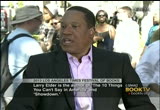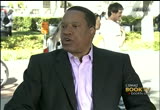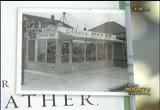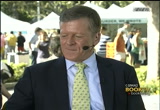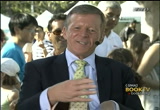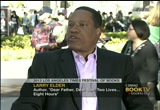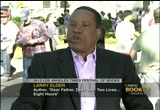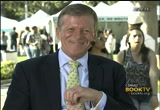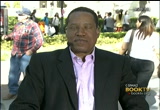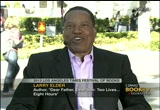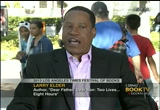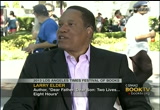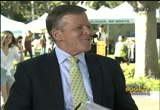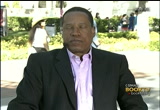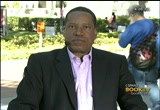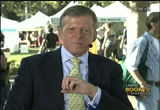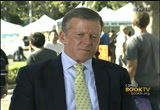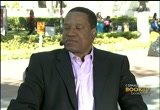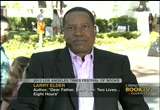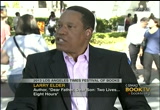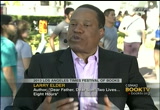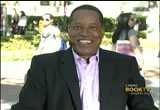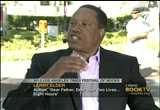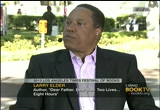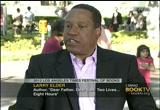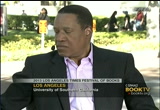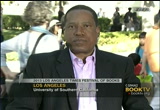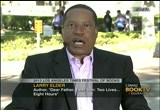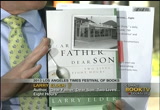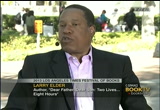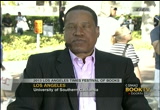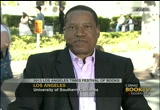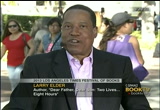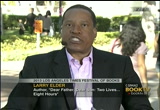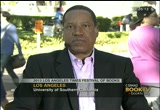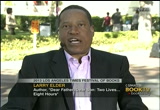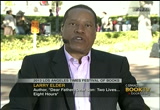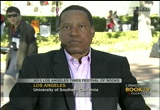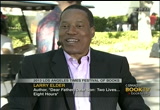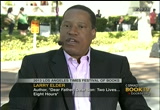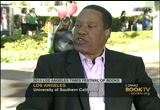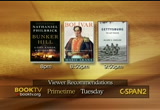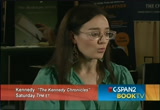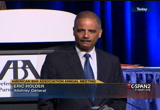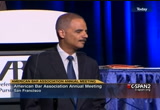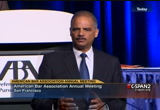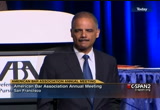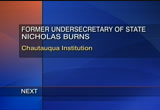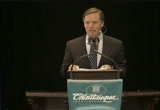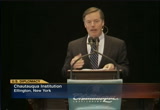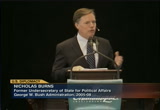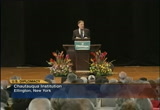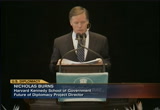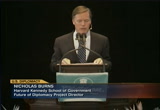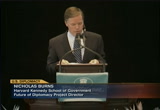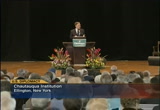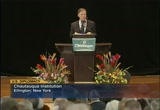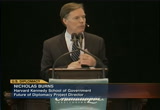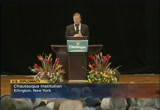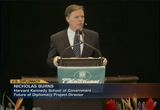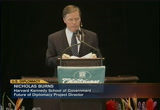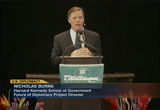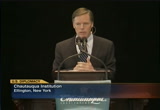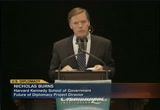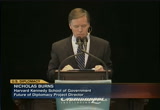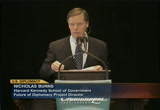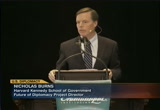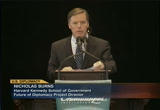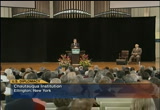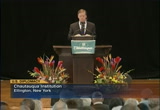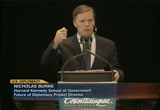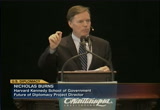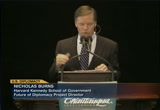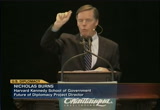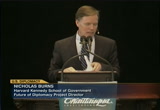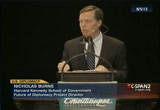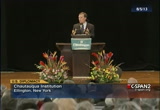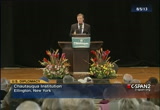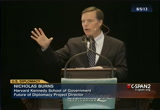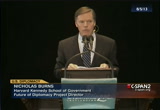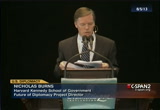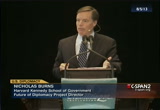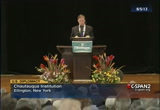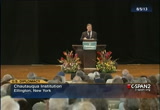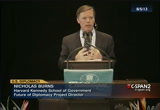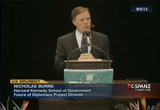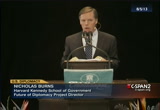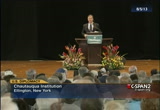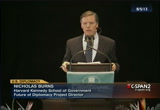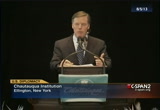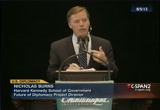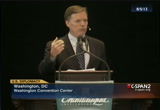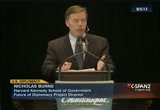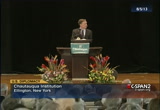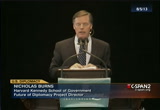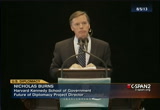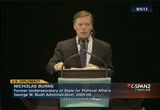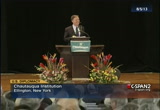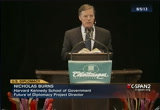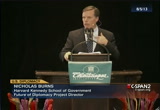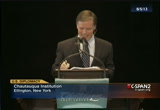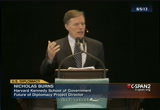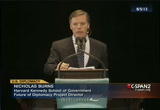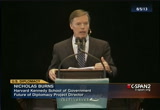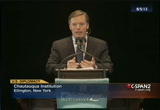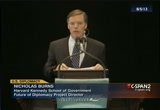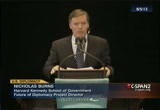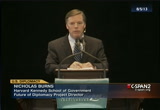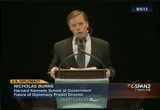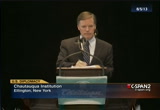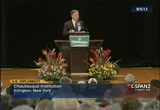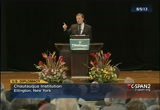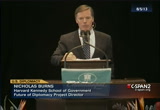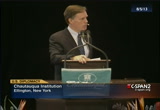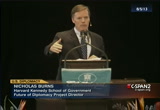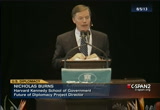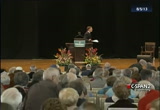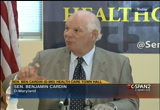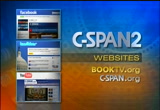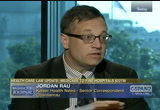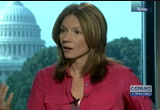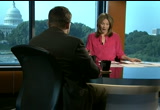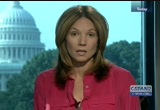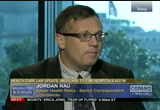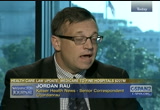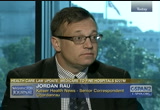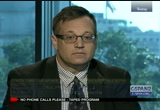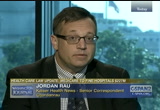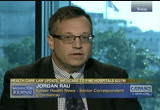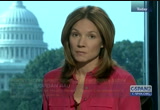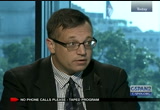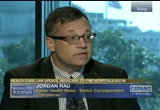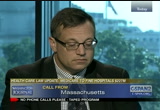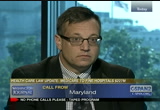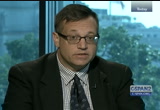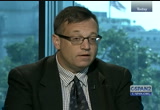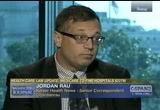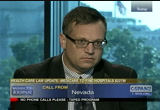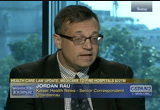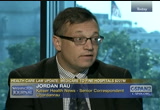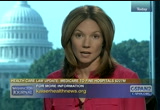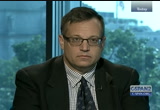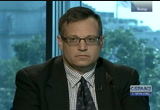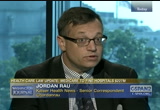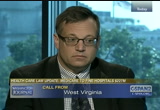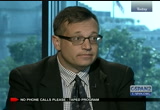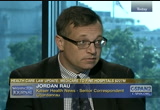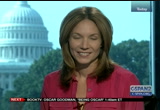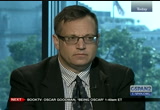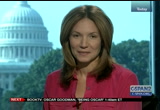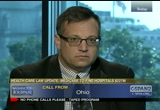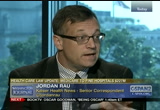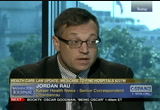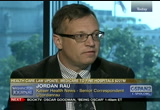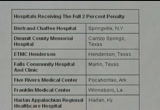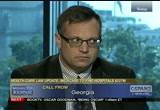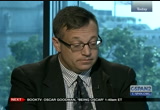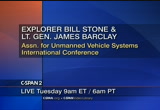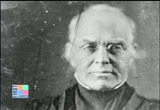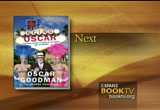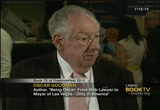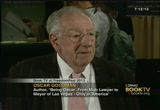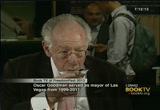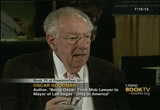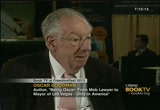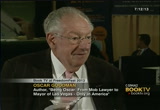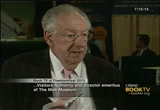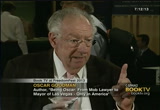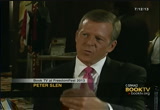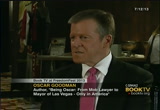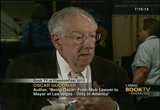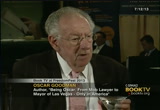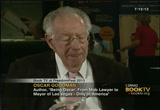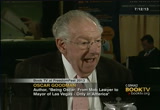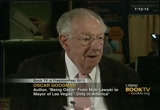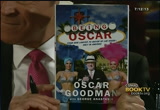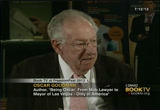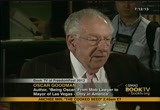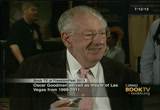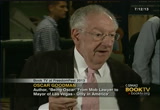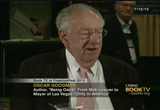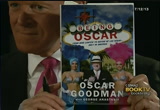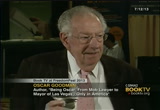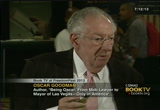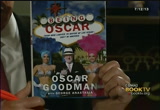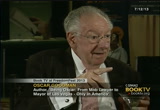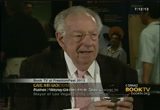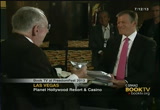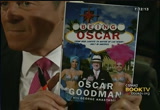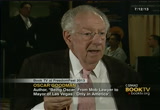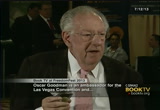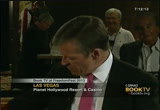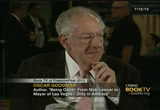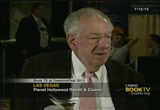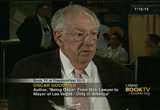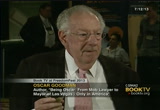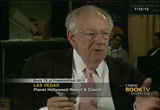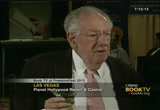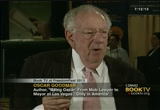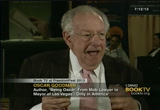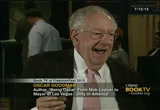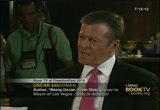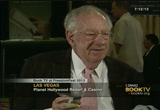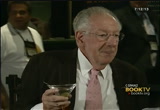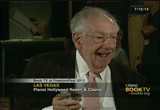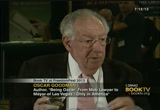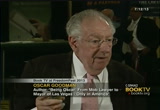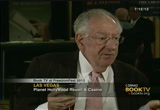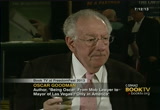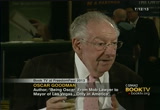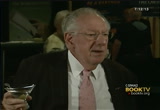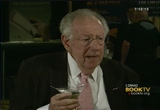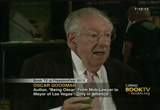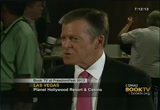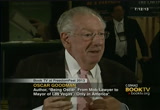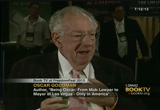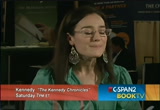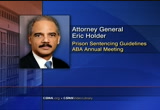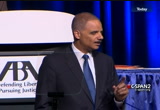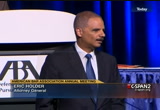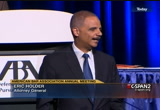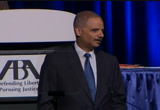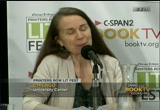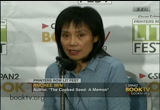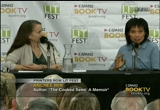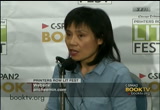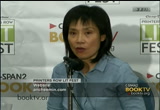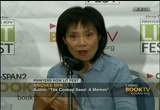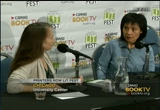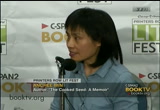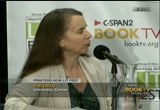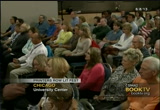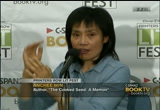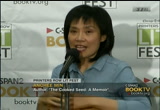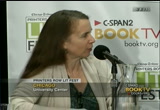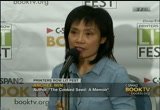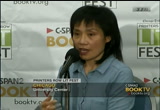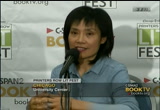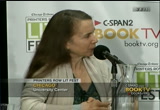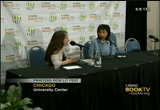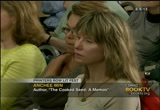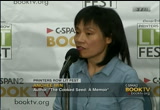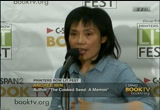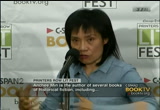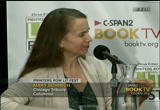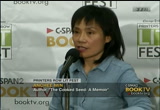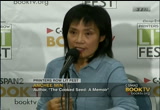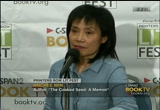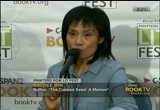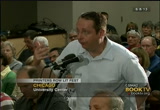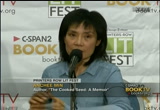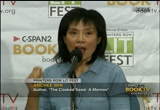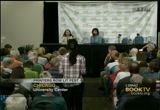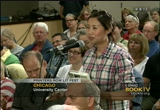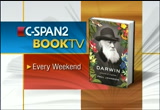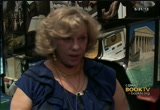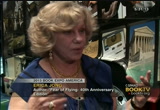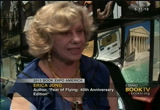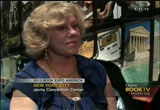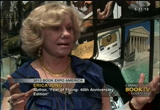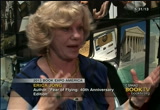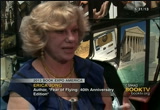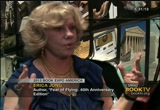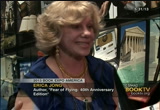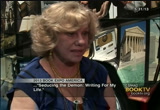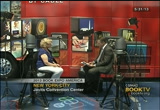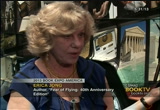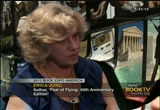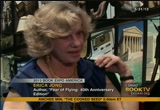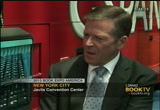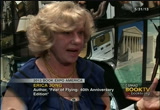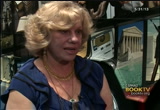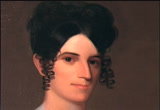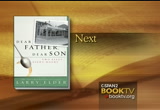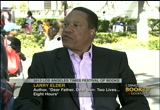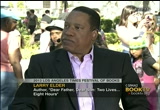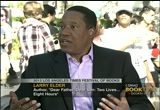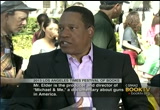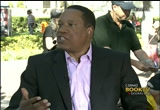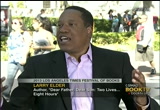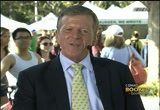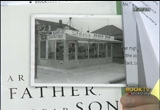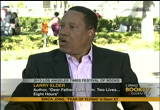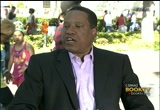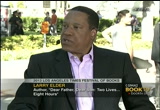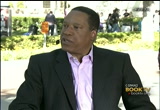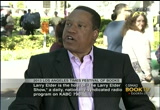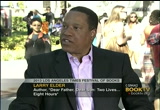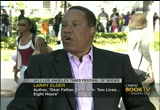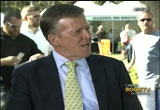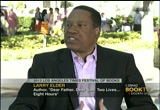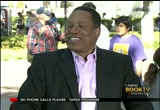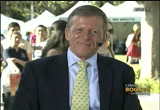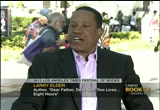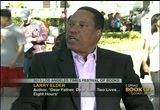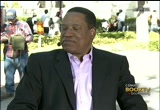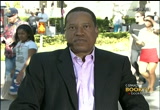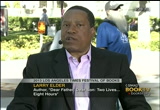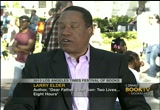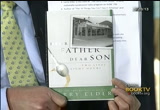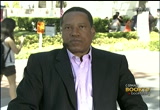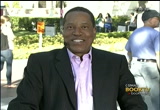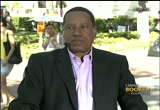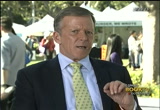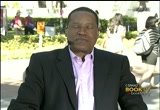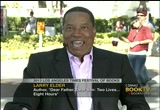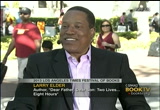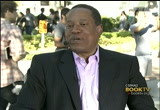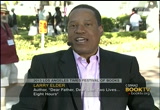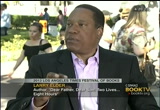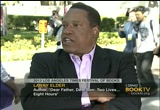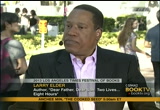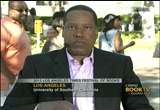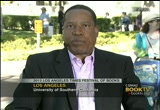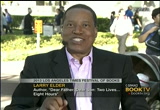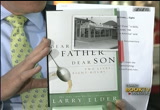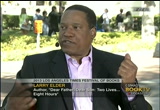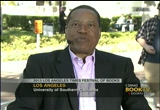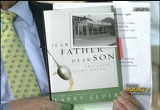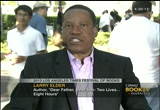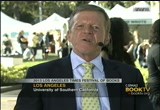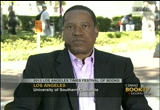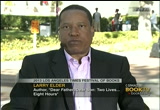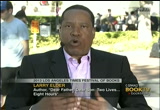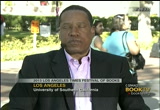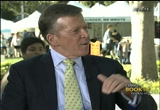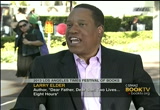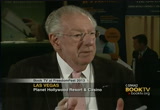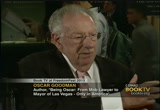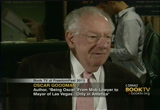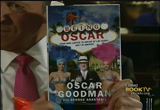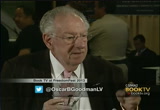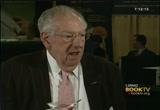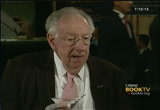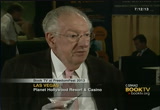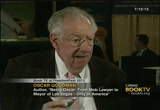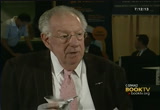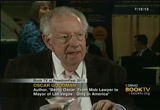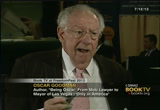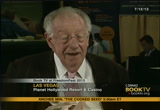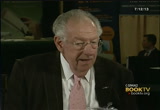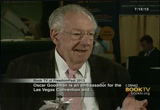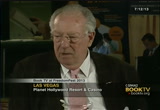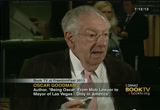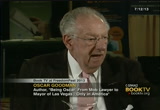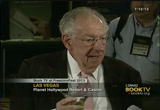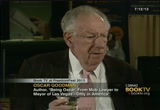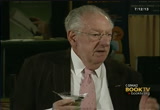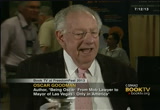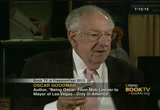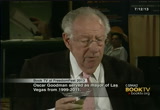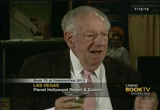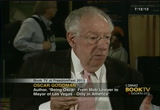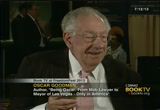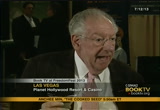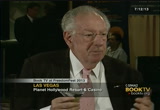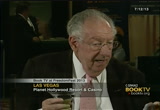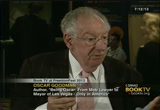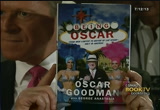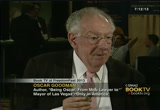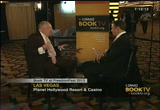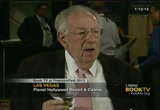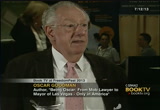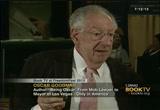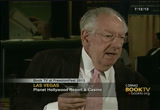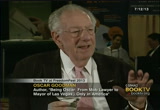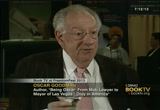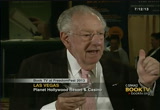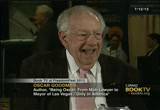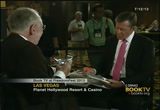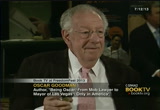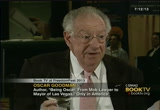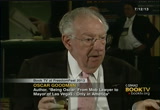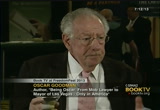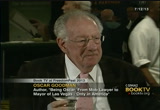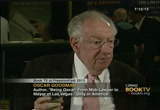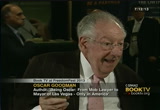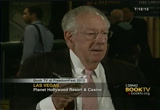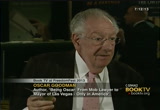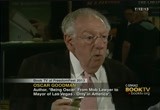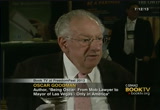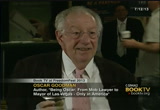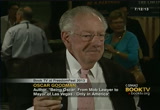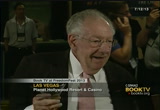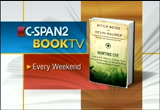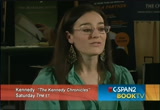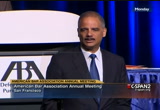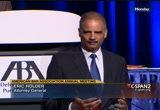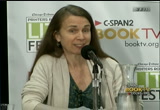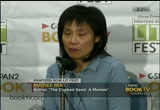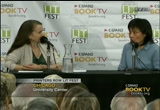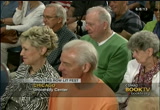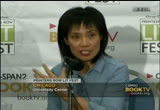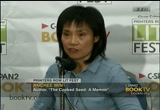tv Capitol Hill Hearings CSPAN August 12, 2013 11:00pm-6:01am EDT
11:00 pm
nuclear-intact family. he doesn't think of himself as a victim. he doesn't think of himself as a trailblazer as far as his race is concerned. he's trying to be the best rg iii he could possibly be, and for a lot of people that means he's a sellout and an uncle tom. it's outrageous. he's a starts guy, for -- sports guy, for crying out loud. wins and losses ought to be the way we evaluate rg iii. >> host: was your book tough to write? >> guest: people have asked me that, and i suppose it might have been, but that was -- i was 25 years old when we reconciled, and i wrote the book a couple years ago. so i've had plenty of time, my dad and i have had 35 years to work op our relationship, and arguably we were closer than my mother and i are. my mother and i are very close. so it wasn't difficult at all. it was, again, a 247-page apology to the man. i was anxious to get it out before he died, and i was able to do so.
11:01 pm
>> host: how far was your boyhood home? >> guest: i was born in south central, picot union which is a pretty heavily hispanic area. and then my dad moved up to south central. we were the second black family on the block, and within five years the whole block was all black. >> host: larry elder, there's a picture on the front of your book, very quickly. and i promise then we'll go to calls. what is this a picture of? >> guest: that's a picture of my dad's restaurant. and if you can look very closely in there, you can see my dad leaning over there. it's one of the rare only photos we have of my dad's café. that's where i was born, in that little house right there. my dad tore it down after the place was zoned for light industrial and built the restaurant there. lousy location. you can't see it, but the food was so good, people found their way. >> host: and you hated working there. >> >> guest: i wouldn't stand working for you. he cursed at me. he would get volatile and start yelling and screaming. you can see how small it was, it
11:02 pm
was embarrassing. and i told myself the next time he cursed at me i'm going to walk up to him and say, now see here, buddy. i didn't have enough guts to confront him, but we did have the conversation that lasted a few minutes, and then we didn't talk for ten years. >> host: i'm done talking, it's your turn. larry elder's our guest. henry in bay shore, new york, you're the first caller. >> guest: i can't hear. >> host: hi, henry. last chance. we're going to move on to ohio, there'd doe, ohio. anthony? anthony, you're on booktv on c-span2 with larry elder. hi, anthony. >> caller: hi, how are you? >> host: please go ahead, sir. >> caller: yes. i was wanting to ask mr. elder, is he having any plans on having another talk show again? [laughter] >> guest: well, anthony, thank you for the question. from your lips to god's
11:03 pm
microphone. i'd love to have another talk show, i'd love to have a show along the lines of a hannity or reilly, political show where you call in and give your opinions, and i'm looking around to try and find that. hopefully, that can happen. >> host: is radio the only thing you're doing right now? >> guest: well, i'm writing a play. i've had a meeting with sony pictures, and they've begin me some optimism maybe this project could be a movie someday. and i want to make it a play first along the lines of what tyler perry did. and then take it to a production house and maybe get it made. >> host: would you star in it like tyler perry does? >> guest: no, i'm not an actor. [laughter] >> host: are you still a lawyer? practicing lawyer? >> guest: i am. i'm not practicing, but i'm still a lawyer. i haven't been disbarred. >> host: john's in west lake village, and i have no idea what your state is, because it's all run off the screen. tell us your state and go ahead with your question or comment. >> caller: california. >> host: thank you, sir. >> caller: i guess i have three questions. number one, do you have any
11:04 pm
children? number two, do you treat your children or would you advise treating your children the way your father treated you? and, number three, does the, does the way your father treated you affect your relationship with people and the way that you approach political discussion? in other words, do you consider yourself -- [inaudible] of the people when they disagree with you? >> guest: well, thank you for that. um, i think the first question was how do i feel -- >> host: do you have children? >> guest: do i have children, thank you. no, i don't. and people have asked me whether or not my not having children had to do with way my father and my mother raised me, and i think probably so. i remember watching them when i was a kid in the kitchen watching them discuss something financial, and i remember saying
11:05 pm
to myself, this doesn't seem like a whole lot of fun. and i really thought that fathers were mean task masters, and i never wanted anybody to feel towards me the way i felt towards my father. when i got into college and i had classmates and was invited to their homes, i saw their homes were very different from my home, and they felt very differently towards their father. so i realized it was not necessarily the way it had to be. but the i do think it probably made me feel, maybe understand how hard it is raising children, what hard work it is and how labor intensive it is. and what i wanted to do was to be a writer and do a lot of traveling. i think i felt probably that i didn't want to make those kinds of sacrifices. i have an enormous appreciation for what my mother and father went through and all of the sacrifices that they did financial and otherwise. when people decide to raise children, i think it is the most important decision you can possibly make maybe short of going into combat. my goodness, you can't send them back? they often don't turn out the way you want them to turn out.
11:06 pm
they often get angry when you're trying to do the best for them. it's a thankless task. but i think the rewards are there, and now that my friends are having kids that are my age, i see why they put in the work. if i had to do it all over again, i probably would have kids. >> host: has it affected your relationship with people, as that caller asked? >> guest: um, i think probably so. i think when you don't feel loved by your father, it makes you a little less warm and a little less loose. and as i said, when my dad and i reconciled, my friends noticed a difference in my personality. they thought i was funnier, happier, more accepting of other people. so i think early on some of this imprinting might have made me have decisions about family and that sort of thing. >> host: patrick, peter borrow, new hampshire. >> guest: thank you for remembering the questions, peter. [laughter] >> host: please go ahead. >> caller: thank you very much. i would like to ask mr. elder -- well, first, i would like to say i really admire your, and am
11:07 pm
impressed with your courage you had to confront your father and go through the working things out with him. i couldn't think of a word the use. >> guest: that's right. >> caller: and i grew up with a very loving father. however, my mother was an alcoholic, so they had all of these fights when i was really young. and i was never aware of what was going on. and so, um, i never, you know, i always want withed my father -- wanted my father to tell me why he was so angry and stuff. and, of course, later on i figured it out. but my question is, um, how open do you think, you know, from your experience, how open dune dune -- do you think a father should be with their children or
11:08 pm
child as to how, what his feelings really are and, you know, how -- you know, his most intimate feelings as far as things he might be dealing with within himself, his own issuesesome. >> guest: right. >> host: all right, patrick, i think we got the point, thank you. larry elder? >> guest: well, i think it's the $64,000, and what you're really asking is to what extent should your father be a friend as opposed to being a parent, and the answer is real simple, he should be a parent. whatever stories the parent has that could perhaps give a lesson, a life lesson to the child, the father should use. but, again, as i said before there's no handbook here. and my book is written from the perspective of my dad. we often talk about how we are raised from the perspective of a child, but we don't think about how our fathers feel about disciplining us. my father told me he didn't like doing it, but he wanted us to
11:09 pm
turn out okay, and he was willing to go through the necessary years, in my case, of being the bad guy in order to achieve the objective which was to have three well-grounded boys. >> host: who are kirk and dennis? >> guest: they are my two brothers, i'm in the middle. dennis was wayward and kirk was much more solid. both of them are vietnam-era vets, dennis in the army, my brother in the navy. dennis, he and i could not stand each other. we fought night and day, day and night, 24/7 the way a lot of boys do. and my little brother, i think, had a problem with me because i was such a good student, and in those days teachers were so insensitive, they would often say to my little brother, how come you're not like larry? so dennis, i think, early on decided to be the anti-larry. i think now a school psychologist would intervene, and we probably would deal with him a little better, but kids often compared him to me, and i think my little brother wanted to be the anti-larry, as i
11:10 pm
explain in my book. >> host: where are they today? >> guest: dennis died about 15 years ago. my older brother is still around, he is a foreman with a major oil company, happily married, has three children -- by the way, both of my brothers married women who had children and went on to have very long marriages. >> host: talk about your brother's funeral and your mother's view and your view and what actually happened. >> guest: you're talking about dennis' funeral. and, again, this is the brother that i didn't get along with. and my brother dropped out of high school. he did a lot of drugs. the military straightened him out. but he got out. he was still fairly wayward. and when he died, i said to my mother, we'll just have a very small service because dennis, dennis' friends are scattered here and yon, and they're not the kind of people that you can reach on a phone and will show up. and she says, you don't know him. we need to have a big church. dennis' friends are going to find out that he died, and they'll be here. it was one of the largest
11:11 pm
funeral i'd been to. almost like maag relate thatcher -- margaret thatcher had died. people were coming from everywhere. he lived in arizona, other parts of the country. people came to pay their respects to him. and when i would hear them talk about him, it was almost like my dad's and my conversation because i would hear things about my brother that i didn't know and things he'd said and done that i didn't know, and he was apparently a far better friend to other people than he was to me in many cases. my brother and i shortly after he died, he was laying in the hospital x we had a very long conversation, and i found out that he did respect me and love me and look up to me, and i told him the same thing. and it was kind of a nice moment. >> host: larry elder, do you have any reticence about writing a family history and putting your life out there in print for people? >> guest: i would not have written that book had my mother still been alive. there's a story i told about how my mother got my brother in the service. i'll let the readers read it. my mother would not have liked me to have told the story.
11:12 pm
but it tells you my mother was gutsy. my mother was tough. and the book, the book is a, a book that's also an ode to her as well, but there's some stories in there that my mother probably would have been embarrassed about. >> host: you know what? i don't often do this, but it's worth getting this book just to read that story about his mom. frank, in montgomery, alabama, you're on with larry elder on booktv. >> caller: mr. elder, i appreciate what you said. but i want to -- >> guest: hi, frank. >> caller: have you read a wonderful poem by robert hayden? a bunch of sundays? it fit well what you're saying about your father. and it's a short, wonderful poem. it begins that -- [inaudible] and put his clothes on in the blue black cold.
11:13 pm
and from then -- [inaudible] weekday weather made bank fires blaze. then he says in the poem that when the rooms are warm, you recall me. i would get up -- [inaudible] driven out the cold and feeling the -- [inaudible] but then he says later on -- [inaudible] what did i know? what did i know of love's austere and lonely offices? finish so -- so the point is, you make the point so well in your talk that your father did love you. but you didn't know that, what that love austere and lonely offices. my father and i never got along together. he lived to be 104 years old, but we never got along together. but i love what you said. and i'm glad you wrote it. republican or whatever you are. [laughter] >> guest: well, thank you very much, and you're absolutely
11:14 pm
right about the old man getting up and going to work every day, not liking it, and that was his role modeling. and and you didn't realize it when you're a kid, to watch somebody get up, and they're complaining, they're grumping, they don't want to go to work, but they do it anyway because they've got obligations. that's what you learn by having a father in the house. one of the things i also talk about is it also affects the girls. you don't have a father in the house, and often what happens is a girl would meet a man and demand thoughts of -- [inaudible] and show her some sort of affection, she embraces this guy. and if he's a bad guy, it's too bad for her. and so not having a father in the house effects not just boys, but girls as well. >> host: larry elder spent several years living in cleveland working for a law firm, and this next call comes from bobby in ohio. >> caller: i've got a question for you in regards to the comment you made about rg 3:and the article about him being called an uncle tom. why would you state that person
11:15 pm
saying that would be republican? wouldn't democrats actually sometimes have feelings like that? i'm a republican, and i don't feel that way towards rg iii, so i'm just curious why you would say that. >> guest: you either misunderstood what i said, or i said it badly. what i said was the espn guy criticized rg iii because he thought he was republican. he said there's a rumor he's republican, i don't know about that. he's got a white fiancee, i don't know about that. he called him a cornball brother because he suspected that rg iii was a republican, but he had a white fiancee. that is why this caster called him a cornball brother which i think is a racist thing. so i'm sorry if i misexplained it. >> host: go ahead, bobby, you're still on the line. >> caller: i appreciate that. i agree the same way you do then. i think it's totally a racist comment also. >> guest: absolutely. >> caller: and -- >> host: thank you, bobby. >> caller: and i'm a republican -- okay, thank you.
11:16 pm
>> guest: all right, thanks for calling in. republicans don't like being called racist, and with good reason. they shouldn't be called racist. >> host: larry elder, "dear father, dear son," is this an african-american story? >> guest: no, it's an american story. it's a story about a guy who struggled, who overcame, who endured the great depression, who joined to fight in the second world war, who was part of what tom brokaw called the greatest generation. it is an american story of hard work, of triumph, of family, of success. this is a guy who did not know his biological father, became a entrepreneur, started a café, being able to buy that piece of property and the little house next door to it, plus the house in south central. my father is an american success story. >> host: linda is in winthrop, massachusetts, larry elder is our guest. >> caller: yes, hi, larry. i have a question for you. >> guest: hi. >> caller: hi. i'm very impressed by your story, and i know there are a lot of people out there that, um, have a hard time forgiving
11:17 pm
whether it's their parents or their spouse, and in some cases even their children. did you find that you were able to have the kind of forgiveness after ten years because you turned your life over to jesus and you gave it to him? i'd be interested to know. >> guest: well, i've always been a christian. my mother was, taught sunday school. so going to church was not an option. i spent my 21st birthday in jerusalem as part of my junior year abroad in israel. i've always been very religious. no, that had nothing to do with it. the reason, i suppose, the ten-year relationship healed so quickly is during the eight-hour conversation because of my father's demeanor. when i unloaded on him and told him all the things he had done harshly, my father was like, is that it? you're mad at me for whipping you with a belt? that's it? do you know to know what my father did to me? and it was horrific. my father was like, is that all
11:18 pm
you have? [laughter] >> host: larry elder, did your father go to church? >> guest: he did not. my father was a religious man though. he did not go to church, and i talk about that in the book. my father felt that organized religion was partly a scam. my father thought there was something wrong about the man in the south who was the pastor during the great depression having the biggest house, driving the nicest car, wearing the nicest clothing. he thought the person who's a man of god should be poor and should be wearing holy clothes and should not be sporting around in the sunday best. he said there was something inherently wrong about that. he also, when he came home, my dad said his mother and the neighbors would be gossipping about what was going on in church. so my father thought going to church was a big dress-up thing, a big thing to gossip, who's doing what, who's sleeping with whom. and my father thought it had very little to do with god, so he worshiped himself. he would often watch
11:19 pm
televangelists on tv and would read the bible, but my father felt that organized church was a ripoff. i'm not saying i agree with him, my mother certainly didn't, but it was one of the differences they had. >> host: you also say your parents never went anywhere together, they lived separate lives. >> guest: my father and my mother slept in separate bedrooms after a while. they never took vacation together. i never saw them kiss, i never saw them hold hands until after my dad and i reconciled, and then i began talking to them both, and i think that i improved their relationship a little bit. and much to my surprise be, they met some friends who lived in scottsdale, arizona, and they actually packed in the car and drove this together. i was stunned. and they stayed in motels along the way. i presume they had to sleep in the same bed. but i think my relationship with my dad, once it healed, improved their as well. >> host: and that couple in scottsdale, that was a white couple, right? and they went to the grand
11:20 pm
canyon? >> guest: they went to the grand canyon. the story they tell me is at the ticket praise -- place the person said i need to know who your family is, and the man said, here they are. all these black people with these white guys, and the ticket guy goes, okay, let 'em through, and they went through. >> host: temple city, california. hi, bob. >> caller: am i really on or no? >> host: yes, you are. >> caller: okay. mr. elder, you're the best. i've been listening to you. 38 year withs army, three wars, blown up in iraq, 32 years hapd. that's not my question. my question is when are you going to stop playing around d lack of words -- and run for president? [laughter] >> guest: two things could happen if i run. one of them is i could win, the other one is i could lose, and both of them are bad. [laughter] but thank you for that. i've given it some thought,
11:21 pm
seriously, and i came this close to running for senate against barbara boxer, and i flew to d.c., and i met a bunch of senators. my be arena lost by ten points, i could have. >> host: larry elder, what do you think about the kerfuffle around dr. ben carson? >> guest: i like dr. carson, and i thought that it was pretty gutsy for him to have said what he said right in front of the president, advocating the use of health savings accounts to deal with medical issues. and i'm not a big proponent of obamacare. i think that obamacare will, ultimately, hurt this country. and i agree with them. but for people who are touting him for running for office? please. to go from being a practicing physician to being president of the united states is not going to happen. i understand how people can get starting with certain people like they did with donald trump. but i'm not a big let's find somebody who i think embodies what i want who's never run for office and is trying to stick
11:22 pm
them in the presidency. it's not going to happen. >> host: what do you think about republican efforts, outreach to african-americans, latinos, etc. >> guest: you have to reach back as well. republicans are not racist. the republican party, as a percentage, more of them voted for the passing of the civil rights act of 1964 than did democrats. and all of those politicians that stood this front of school doors, they were democrats. george wallace was a democrat. orville -- [inaudible] of little rock was a democrat. and not all of them became republicans once the civil rights act got passed. so the idea that republicans are racist is not fair. you look at the his right-of-way the democratic -- history of the democratic party, this is a party that voted against the 13th, 14th amendment and basically every civil rights legislation passed in the 9th century -- 19th century, the republican party was against it. the first successful presidential candidate was a guy named abraham lincoln. republicans have a major story to tell.
11:23 pm
but often people don't want to hear about it, they believe the republicans are racist, and they shut their minds to it. this is not your grandfather's republican party. republicans are very sensitive about reaching out to blacks and hispanics. but they often con desend. they often say things like, oh, i know somebody who picked fruit with cesar chavez. i'm not looking for a fishing buddy, i'm looking for somebody who's going to advance policies that i want. i want a government who says out of my wallet and bedroom, and whatever politician delivers it gets my vote. >> host: why do you think mitt romney lostsome. >> guest: because if you look at exit polling, most americans believe the economy was so messed up by george bush that obama struggled mightily to overcome this horrible situation he inherited. the second reason is most americans believe republicans only care about rich people. and those are branding problems that the republican party has to to overcome. and it's hard to overcome it because you've got three obstacles; academia, hollywood
11:24 pm
and our major media, all of which are overwhelmingly liberal. when you say something, it's got to be interpreted through the filter of those three entities, and often it's been distorted. >> host: larry elder is our guest, this is booktv on c-span2 live from the los angeles times festival of books, campus of usc. mike's in fort worth, texas. hi, mike. >> caller: how's it going, larry? my -- pretty good. i'm a african-american democrat, but i agree with you one of the big problems in the african-american community is lack of fathers in the house. but i think, larry, when you say that, you kind of come off kind of harsh on black people. now, what's the reason behind the lack of a lot of fathers being in the house, drinking or in prison? well, back -- this is my belief. back in the '30s and '40s black people were lawyers, they had their own businesses like your father had that restaurant. today had, they were dentists --
11:25 pm
they had, they were dentists, we had a lot of grocery stores because there was segregation, and we couldn't go to white places, so we had to become plumbers, our dentists, doctors and physicians. well, for the last 56 years there hasn't been, there hasn't been -- black youngsters haven't seen, haven't been able to go to the black dentist say like in the '30s or '40s or to a grocery store that's owned by black people or to a black doctor's office. you get my point, what i'm trying to say? all they see is the gangs and the fast money. so the lack of black businesses and for youngsters to see that and say i want to be like that, i want to be, own a grocery store, i want to be like that mechanic or doctor, that's part of the problem too. i just want to get your comment on that, larry. >> guest: well, it still comes back down to the lack of fathers. look at these census reports. 1890-1940, a black person was more likely to be married than a white person.
11:26 pm
transfer, a black child was -- therefore, a black child was more likely to be born in a nuclear-intact family. and as i mentioned, in 1965, 25% of black kids were born outside wedlock. fast forward, it's now three times that. what's the answer? racism? really? during the great depression, 50% of black adults were unemployed. you didn't find this kind of criminality. the other -- poverty? again, 50% of black adults were unemployed during the great depression, and you had jim crow where it was legal and de facto segregation. you didn't find the same kind of criminality. we have spent $16 trillion since 1965 on poverty, and what we've done is we've destabilized families. that is why when a kid sees a gang banger, as you mentioned, he looks at that gang banger and thinks, hey, this is what i want to be. he doesn't have a father to say, wait a second, this is not the way to go.
11:27 pm
hit the books two good, hard hours a day. finish high school, don't have a kid before you're 20 years old and get married before you have that kid. if you do that, you will not be poor. the question we have to ask ourselves is, what policies are we doing that are giving people the incentive or disincentive to follow that formula? >> host: larry elder, a conversation between you and your mother beginning with your mother. your mother thought -- your father thought small. don't make the same mistake. that's unfair. oh, here you go again, defending him. he's not donald trump. he was a wimp, she said. >> guest: yeah. my mother -- she was in a bad mood at the time he said that. my mother thought my father should have been a more successful businessman, and i didn't think that was a fair criticism. i thought my daddied the best he could with what he did. he kept the door open. most restaurants fail, and to have a restaurant that remained open until my dad was in his 80s is a hell of an achievement. and i thought my father
11:28 pm
belittled his achievement. again, my mother was not the warmest and most fuzzy person, but i didn't take too much to heart with that statement. >> host: she spent a little bit of time on your radio program, too, didn't she? >> guest: my mother was on every friday for a whole hour, probably the most popular feature because she told it like it was. she didn't pull any punches. my mother didn't like something, she'd say so. and people loved her candor. >> host: iraq. what would your mother -- i'm sorry, iran. what would your mother have done with iran? >> guest: well, i tell the story in the book, i was a first-year law student, and this is when the hostages were taken in iraq -- in iran. and we were all talking about what should be done, and one guy said we ought to file a class action lawsuit and freeze assets and all this and that. and i said i know what my mother would do. they said, what? she'd give 'em 48 hours and bomb the hell out of them. everyone said, oh, no. so i said, watch. i picked up my phone. i called my mom in l.a.
11:29 pm
i said, mom, the hostage thing in iran. she goes, yeah? what would you do about it? uh-huh, uh-huh, uh-huh. hung up the pone the. well, did she say she'd give 'em 48 hours? i said, no, she's mellowing out, she'd give them 72. [laughter] >> host: katherine in hannah, utah. good afternoon. >> caller: yeah. >> host: katherine, we're listening. please go ahead with your question or comment for larry elder. >> caller: oh, i'm sorry. i didn't hear. i wanted to say thank you so much, first of all, for sharing your personal story. it's very inspiring. i -- [inaudible] a kid like you. he's 30 years old, and he's afraid to be a bad dad. but he's an amazing man. he's doing everything and anything not to be like that, so what kind of reaffirming or things that you want to do for him to say, no, you can, you can be a great dad, actually? >> guest: i would tell him,
11:30 pm
again, not to try and be his friend. recognize there are going to be periods of time where the kid won't like you, may even hate you the way i did my father. and you have to hope that be you've done your job, at some point there'll be a realization that you've done your job, and your kid will appreciate that. every kid that i know of sooner or later has that epiphany. sooner or later, it happens. every parent recognizes that, and good participants realize -- good parents realize sooner or later a kid will thank them for their sacrifice. >> host: sandy in marino, california, please go ahead with your question or comment for larry elder. >> caller: hi, larry. thank you so much for taking this call. very interesting story you have. i just have a quick question. you mentioned earlier that the breaking point was when your dad used certain language to you, and you left the restaurant, and you hadn't spoken to him for ten years after thatment -- that. so how did you live in the house with your dad for ten b years as a teenager without saying
11:31 pm
anything to him, or was it not that drastic? >> guest: well, it was kind of drastic. we don't have a big house. the house, as you can see, was on the same plot where the restaurant is. so it wasn't a big house. but by then we had moved, and the house we have right now was not much bigger. remember, my dad worked real hard, he came home late. i'm a teenager, so i left for college when i was 17, so it was just two years of, basically, avoiding him. and we were like two ships passing in the night. he'd come in real late, i would be asleep. i would get up, he would be gone, so it was easy to avoid not talking to him, and then once i left to college, i went to college in rhode island, and then i went to law school in michigan. so i was not in the same state with him, so it was quite easy to avoid him. and by the way, the caller who said that it seemed kind of harsh what i was saying about not having fathers, i interviewed the head of the
11:32 pm
naacp, and i said to him as between the presence of white racism or absence of black fathers, which poses a bigger threat to the black community, and without missing a beat, to his credit, he said the absence of black fathers. there's a movie called boys in the hood, and the director is john singleton. he talks about two families. one is the family of ice cube, no father in the house, and you saw how the family turned around. the other family was across the street, and that was cube baa gooding jr., and lawrence fish burn was his father. and he turned out very differently. and john singleton did a second movie called baby boy which he talked about the sexual predatory behavior of young black men, and john singleton is from the same area that i'm from. he's talking about the centrality of fathers and the lack of fathers being the central problem in south central and, in my opinion, the central social problem in america. >> host: next call for mr. elder, we have about seven minutes left in our program. dennis in sharon, massachusetts.
11:33 pm
hi, dennis. dennis? >> caller: yes. can you hear me? yes -- >> host: please go ahead. >> caller: okay, great. i'm a great fan of c-span. i watch booktv every weekend. my father was born in 1892, i was his first son. when i was born, he was in 60 years old. he left macon, georgia, as he told we because he saw a black man being burned in the fountain of downtown macon, georgia. the point i would like to make is that i really believe it's, obviously, the father being in the household is a tremendous service to the children, without a doubt. but most importantly i really believe this thing about mind power. having the focus in order to be able to have a discipline to achieve what your goals are in
11:34 pm
life. the other thing i want to say is that there's a psychological underpinning that i believe hardly anybody talks about in which people aspire to be the anti-antihero. so a lot of this outburst that we see is really someone who really believes by doing something that, quote-unquote superbad, is better than being good. people want to do the contradiction. and that's what is sort of at the underlying literature that's in the culture. and i'd like to hear what your comment to that is. >> guest: well, i think you're right. i think if you don't have an appropriation role model -- appropriate role model in the house acting out, trying to get some sort of attention to scratch that itch is what, often, people do. one of the things my dad can and i talked about when we reconciled was these so-called black leaders that don't emphasize the real issue, and that's the lack of fathers in the house. you find a lot of people emphasizing racism, racism,
11:35 pm
racism, and as i pointed out, in my humble opinion, racism is no longer the major rob in america. let's just take jesse jackson. his mother was a teenager who was impregnated by the man who lived next door, and jesse jackson was raised in south carolina, and he was taunted by kids saying jesse ain't got no daddy. so it seems to we he ought to be talking about the importance of having a father in the house. farrakhan, farrakhan's mother was estranged from her father. she had a boyfriend. went back with the father, got pregnant, didn't want the boyfriend to know, so she tried to abort louis farrakhan three times with a coat hanger. and in the case of sharpton, sharpton lived a middle class life until his father abandoned the family, and then down to the ghetto. they talk about racism, racism as opposed to the centrality of fathers even though in their own lives the lack of their dads, in my opinion, had a very profound impact of how they view the world. one of the reasons they're so angry, perhaps, is because they didn't b have a father in the
11:36 pm
house, and instead of talking about importance of fathers and policies that can encourage people to get married before having children, they talk about racism, racism, racism. in my opinion, they're doing a disservice to the community. i think they're being leaders to the best of their ability, don't get me wrong. i don't think they're doing it in bad faith, but i think they ought to rethink what they're doing. >> host: leroy, ham den, connecticut. please go ahead. >> caller: yes. i'd just like to say, i kind of agree with what you're saying about a strong father in the home, but my thing was i was raised in four different foster homes. and the fathers were strong figures on the disciplinary side. there was never any love, never any hugging. it was going to school and do your homework and be good. but the thing that really bothered me, i never knew love from a father. all i knew was discipline. it did teach me one thing, work and you'll be successful. even though without love i found
11:37 pm
that out. and the last foster home i lived in i really loved that man. he never knew it. he died before i had a chance to tell him. but that's why i'm so glad you had a chance to sit down and can talk to your father. but it taught me one thing that you said that you did the best, they did the best they could with what they knew. my children, and when they grew up, they told me the same thing. dad, we love you. you may not have been the best father in the world, but you were the best for us because you did the best that you knew how to do, and they're all successful now. they're all with college educations. i just wanted to share that with you. >> host: all right, thank you, leroy. >> guest: thank you very much. could you imagine the lawsuit i had against my father based on how he raised me and the way kids are right now? i probably could have called 911 and had somebody out come out and take him away based on how kids were discipline inside those days. >> host: in your book you talk about graduating from crenshaw
11:38 pm
high school but also going to fairfax high school here in l.a. for some other courses and the difference between the two. >> guest: yeah. one of the reasons i'm so adamant about having parental choice in education is because i went to an inner city public high school, crenshaw high school, and i thought i was a world leader. i graduated number seven in my class, and i had exhausted all of the spanish we had. i'd gotten as all the way up. and we had a program called air program enrichment ec change, and it was an peoplerral d experimental program. and if you didn't have a course, you could be bussed for some classes to that school. so i was bussed to fairfax which was then almost 100% jewish for one semester. i took spanish, and i took physiology, and i was flunking both those courses. i never flunked a course in my life. these kids were held to higher standards, their teachers expected more out of them. the kids were expected to speak spanish, and i learned that the
11:39 pm
expectation was far, far different in my inner city high school than it was in a suburban high school. and it made me angry. and i was determined that i was going to make sure i was going to advocate the power that parents should have to take their kids out of a bad school and put them into a better show. >> host: what time is your radio show on? >> guest: 3 until 6 monday through friday, pacific time. >> host: and people can hear it where? >> guest: kabc.com, larryelder.com, facebook and twitter. >> host: and larry elder's most recent book is "dear father, dear son. two hours, two lives, eight hours --" >> guest: right. >> host: are you working on another book? >> guest: of course. writers are always working on another book. >> host: does it come back to politics? >> guest: actually, it's not. it's about a young italian guy who grew up with a father who had a voice every bit as good as frank sinatra and used the voice the scam people. that's all he did. he would do a concert, and old ladies would come up to him, and
11:40 pm
they'd give him money for a movie, and he'd take their movie and go to the next town. and this is the father that a friend of mine had. he's got all his music, and i'm telling you, this guy was a wonderful singer. people compare him to some of the great singers like caruso. so that's what the next book is about. >> host: sounds like you're venturing out away from politics a little bit. >> guest: i do like writing in general, but every one of my books has a political core to it. >> host: well, we've been talking here on booktv with larry elder. "dear father, dear son: two lives, eight hours." pick up the book to find out how his mom got his brother dennis into the military.
11:41 pm
>> i've seen mtv was incredibly powerful because they realize they could tap into a generation end of used voters and this is a time when did you are in your teens and early 20s who are most passionate about things in life. they realized you could turn that to politics and would be an incredible force. regardless if i agreed or disagreed with the politics of the people who served over me as my boss i liked the fact they wanted to
11:42 pm
engage people or they wanted people to express and learn about their own political meaning and feelings than every once in awhile i would get bloody and make set up and i thought that was for the benefit of all because when you challenge one another what you believe and what you believe it to make sure better person not just politically but all around >> right now unwarranted disparities are far too common as obama said last
11:43 pm
month it is time to ask tough questions about how we can strengthen our communities, for young people, address the fact the young black and latino men are to become victims as well as perpetrators. we also must confront the reality that once they're in that system people of color often face harsher punishment than their peers. one deeply troubling report released february of this year indicates black male offenders receive senses nearly 20 percent longer than those imposed on white males convicted of similar crimes. this is not just unacceptable it is shameful. [applause] it is unworthy of our great
11:44 pm
country of our great legal tradition. in response i have directed a group of u.s. attorneys to look at sentencing disparities and develop recommendations how we can address this. in this area we as a country must agree to do better and we agree to take a pragmatic approach we will announce that we will take actions to recalibrate the america's federal criminal justice system by starting fundamentally you rethinking the notion of mandatory minimum sentences for drug-related crimes. [applause] some statutes that mandate and flexible sentences regardless of the individual conduct at issue in a
11:45 pm
particular case. reduce the discretion available to prosecutors, judges, juries because they generate and fair long sentences a.m. breed disrespect for the system. when applied indiscriminately they do not serve public safety. be honest, with those enforcement priorities have had a destabilizing effect on particular communities largely pork, and of color, applied inappropriately they're ultimately counterproductive that is why i have mandated the modification of the justice department policies so certain low-level nonviolent drug offenders with no ties to let things or cartels will no longer be charged that have if draconian it mandatory minimum sentences. [applause] they now will be charged with offenses that are
11:46 pm
better suited to their individual conduct rather than excessive prison terms more appropriate for the drug kingpins. by reserving the most severe penalties for serious serious, highest level drug traffickers we can better promote public safety and rehabilitation while making expenditures smarter and more productive. we have seen this approach has by a partisan support including mike lee and rand paul and dick durbin have promise legislate -- legislation and a mean giving judges more discretion to certain drug offenders.
11:47 pm
[applause] thank you, mr. chairman president. good morning everyone. it is a beautiful morning. but i detected very early a hint of often in the air. i don't know if you did. you may have seen recently "the new york times" article about a renaissance throwback to another century, the 19th century where families find new york and ohio and pennsylvania and the canadian provinces came to loof spend summer to restore themselves in a place called the chautauqua it describes what makes it so unique at least for me to
11:48 pm
pursue a beauty of truth or spiritualism philosophy of what makes life special and was a great tribute to a generations have done to built this amphitheater in extraordinary campus the only surprise for me was the revelation that now there are several in the united states had not realized that i guess that is the success of your brand because all of us know this is the mother ship the true place. [laughter] and the heart of the move is a wanted to start by paying tribute to chautauqua. the reality rush hour reality tv free zone that is one of the appeals. [laughter] i cannot claim i am not a true native like many of you that go back sometime six
11:49 pm
generations but i grew up outside of boston massachusetts i am a patriot spain and admittedly behind enemy lines in buffalo bills territory but as i said last year would help my cause and if i was born in buffalo general hospital? [laughter] mr. president, i like to apply for citizenship again in chautauqua nation. [laughter] it is an honor to be back with you i am pleased to be discussing diplomacy and i am glad you have thought about this art sometimes misunderstood but always important i and a former career diplomat i observed by president was the lowest ranking person in the u.s. government an intern at the embassy in west africa in
11:50 pm
1980. [laughter] until my last job as undersecretary of state in 2008 now i can teach diplomacy and international politics to students all over the world with 90 different countries represented at the kennedy school. i teach for a living so i thought why not start with a question for you this morning that you can think about? then give me a sense of what it is. what you think about when you hear the word diplomacy? what images and does it conjure up? what values to reattach? there may be a pop quiz but when i ask that question people will say diplomats are steffi in suits with gilded palaces and talk ad
11:51 pm
nauseam about the problems of the world. i hear that from time to time as people describe the career that i had. that is one true in digit you think of a formal nature think of the 19th century, and bismarck the congress of berlin in 1878, that was the russo turkish war and think of woodrow wilson in a morning coat at the versailles peace conference in 1990 with his open covenants to create a better world after the first world war but we live in the 21st century and diplomats today come from 195 member states of the united nations and often act quite differently than woodrow wilson and happily and very
11:52 pm
importantly more are women they used to dominate the field. but what they've read the dominick diplomats but now we have nation's rising to global power in africa and latin america sometimes from countries that did not exist in the colonial world of 1813 and 1940 at the start of the first world war diplomats today represent government but they also represent international institutions like the united nations, you flash it -- fly the flag here and like the world bank and international monetary fund and i think people who work for non profit organizations
11:53 pm
dedicated to combating poverty to promote economic development to promote health care or peace, i think they are diplomats also. so think of still and melinda gates the enormously positive impact those two people and their foundation have on the fight of hiv/aids, malaria, eradicate polio which is nearly complete there's only three countries in the world where it exists. think of michelle kwan who has joined the state department part-time as a sports emissary for the state department as has cal ripken the former great baltimore oriole shortstop. diplomacy today is far more diverse and inclusive than it was 100 years ago and traditional diplomacy is the
11:54 pm
management of international relations by negotiation that is a very precise definition that tells you what about diplomacy be here is another way to think about it. is everything that all of us do. 7 billion people in 195 countries to manage relations around the world to negotiate and interpret each other to translate and with philosophical differences and the first dose that may collide from time to time that is a critical job to make the countries in the world in a nutshell work together more efficiently and profitably and more peacefully. diplomacy embodies activities so one week ago today when you saw our
11:55 pm
secretary of state john kerry open negotiations in washington between the israelis and palestinians, that is diplomacy when president obama and russian president vladimir putin meets in st. petersburg to talk about global economic problems problems, that too is diplomacy when president bush and president obama negotiated one by one free trade agreements and panama that is economic diplomacy and emanations me to to fight climate change to eradicate trafficking of women and children and try to fight crime cartels that dismal bilateral diplomacy and will remove hundreds of tons of thousands of food aid to poor countries like north korea that is
11:56 pm
humanitarian diplomacy so it encompasses those thousands of actions taken each day by government like ours and international organizations like the wind by nonprofit organizations like the gates foundation to connect countries, regions, connect towns around the world, most important, people around the world because we do live in a very small, very foldable, sometimes silent planet. i found to have my years that diplomacy is really about hope. it is the great hope that all of us have in every country that we don't have to except -- accept the status quo we can look at the differences between
11:57 pm
people with the cataclysmic war and help we can improve and change for good, the human condition, that is a powerful aspiration. i never imagined when i was growing up in wellesley massachusetts that would become a diplomat. what i really wanted to do was be a shortstop of the boston and red sox. [laughter] like every other kid in the 1960's a '70s but it finally dawned on me that the baseball career would not help work out and i found by calling in a very strange and different place called the vietnam war. i was too young to serve i turned 17 today the cease-fire was announced a remember the church bells ringing in my home town. jubilation and frustrating
11:58 pm
it was coming to a close for the united states. i had seen, as many of you how the young men served briefly and honorably were not always will come back to our towns with dignity and honor that was certainly there do. vietnam as you may remember the threads that connect 50 states together, our families together, and our generations and even with my limited teenage perspective perspective, i did not know much, i could grasp the incongruity that a superpower like ours could become a civil war halfway around the road with the poor nation that did not represent a strategic threat to us. that is how would appears today with the advantage of
11:59 pm
20/20 hindsight and the passage of 40 years since the cease fires in 1973 but in vietnam berndt to my interest in diplomacy and give then my rudimentary grasp of world geography i had to consult an atlas to find out where was on the map. when i was conscious of the fact there were young man -- -- one member fighting there. then the question that occurs to almost every american that was the lighting conscious at that time why do we fight a people that we knew so little about? was it right? was a smart? how do we extricate ourselves we fight with one arm tied behind hour back? was there a better way or different way for america to act or lead in the world? like so many others in my
12:00 am
generation it was the impetus that opened the world even though i never got there. i did not serve but it came right into our home town and forced us to look beyond the pacific to appreciate that is a complicated world when you go into the china shop you have to be careful when you throw your weight around. 40 years later vietnam's still recalls for me the ultimate purpose of diplomacy. . .
12:01 am
s. ancient greeks put it it will never be possible they set this tame the savageness of man that we know we have to try. our path will be eliminated via phrase robert kennedy used in his brief and tragic run for the presidency in 1968. he said that one of the purposes of our country must must be andes or tennyson's words alfred lord tennyson to seek a newer world, to seek a newer world from the broken world that we inherited after those trials and tribulations of the 1960s. that's not very different from some of the challenges that we inherit here in 2013. for me that's the ultimate promise of diplomacy a newer and better world and hopefully if we
12:02 am
are lucky and smart a more peaceful words so chautauqua's right to talk about this subject and to focus on the problems of 2013. when you think about our situation right now just think about the time since 9/11. it's been a difficult and violent 12 years since the terrorist attacks of 9/11 brought down the symbol of our economic power on wall street, collided with a symbol and reality of our military power the pentagon in washington and shook the foundations of our country. in response, we came out swinging. we invaded to muslim countries. we fought to bitter and bloody wars in both places. we paid an enormous price in the lives of our soldiers and in treasure and sometimes an global
12:03 am
credibility. we also did some good things and reflect on what the american military and their people or able to accomplish in iraq and especially in afghanistan, rebuilding schools and giving now 9 million young kids a chance to go to school in afghanistan where barely 1 million were going to school on september 10, 2001. we have done some good things as well in both countries that are experienced in iraq and afghanistan can provide a unique respected about the value of diplomacy and how americans ought to think about the world as we go forward. the thing about us and we all know it is we are so powerful compared to everybody else. if you compare our military for instance toothy 10 next strongest countries in the world combined, we are still more powerful. and so there's a temptatiotemptatio n in washington and i have succumbed to it myself.
12:04 am
sometimes default to the military to meet the most difficult international challenges. it's a big question. do we fight other countries or do we talk to them to resolve our problems? sometimes the use of force can appear faster, clean-air, more efficient, more direct is a way to accomplish a problem. diplomacy by contrast can move at a glacial pace and it requires implementations but remember that patients in virtue patience and restraint, excuse me conquer our virtues. george mitchell i was with him a couple of weeks ago tells a great story that illustrates the importance of patience when you go-round the world and interact with other countries. he was her negotiator for president clinton in northern ireland and he met with a lot of frustration.
12:05 am
he said about his experience he said i experienced 700 days of failure in one day of success. the day he was finally able to secure the good friday agreement that brought peace to northern ireland. the 700 days of failure in one day of success so when people sais secretary kerry you are never going to resolve the crisis. it may take a 7000 days but there will be a day when someone is able to pull those two together into peace and it will have been worth it because we will have been patient. and we will not have resorted to some other alternative that gets us into a lot of trouble. so there are times of course when diplomacy is not the answer. it's not a panacea. there are times when the use of force is both necessary and as president obama suddenness memorable nouvelle speech
12:06 am
imperial japan to stop them and when the second world war. president clinton use military force to stop two wars and save the muslim populations of bosnia and kosovo. most people would agree, cannot everybody but i think a lot of people would agree that president george w. bush was obligated to strike back against al qaeda after september 11, 2001 when we are attacked and we had to respond. i think most people would say that president obama had every right to launch the abbottabad raid that killed osama bin laden. history does demonstrate that its diplomacy coexist they interact with each other and they sometimes can complement each other. richard holbrooke the late richard holbrooke great american diplomat. i don't think he would you woule been able to secure the peace in bosnia had we not used force for
12:07 am
six weeks to demonstrate to the bosnian-serb army that we were not going to let them continue to kill innocent muslims. in fact the use of force achieved a cease of fire drove them to the negotiating table where holbrooke worked his magic and brought to peace to bosnia after five years of war. their times we have to rely on our military and we are fortunate as all of you know to have extraordinary young men and women in our military in the army navy air air force marines and the coast guard in the national guard. [applause] and like you who just applauded i admired the american military. they're absolutely critical to our security. one of the proudest moment of my career was when i served as u.s. ambassador to nato. that's a joint state department defense department mission. i actually had more military people on my staff and i did diplomats and i went to the
12:08 am
field and saw them in kosovo and saw them in bosnia. it was so impressing by how competent and professional insincere they were about representing us in those very difficult a tool grounds of the military was not the problem. but the problem is that we are emerging from more than a decade of war the two longest force in her history and we chose to fight them for good or ill simultaneously and we discovered in both places an age-old truth and i'm going to paraphrase churchill here that when you start a war you really have no idea when and how that war is going to come to a close. we in the u.s. government and i served in 2001 in nato and 9/11. we had no idea that our troops would still be in afghanistan 12 years after they arrived in
12:09 am
october 2001. we had no idea and didn't even remotely consider that we would would stay a cure's in iraq and that is the major reason that president george w. bush and secretary of state condoleezza rice in the second bush term in his five years in office had an abiding impulse that we need to lead with diplomacy not lead with a military international affairs. we can see now looking back on it. [applause] we can really see looking back on it that we asked too much of our military after 9/11. i have a lot of young military officers and mike class. they come for a one-year master's degree program and i will sit down with them one-on-one to get to know them and invariably i will say to a colonel or a major sometimes the captain what have you done over the last 10 or 12 years? years? and invariably they will list
12:10 am
for five combat tours in iraq and afghanistan the most intensively deployed military in american history. what they have done a spectacular but we have asked them to do an awful lot. we were right in my view to fully fund the military since 9/11 but what we did was deprive the state department and the u.s. agency of international development of funds. there is as a result an enormous gap between the size and power of the pentagon and the size and power of the state department. i will illustrate it with two examples from bob gates who is an outstanding secretary of defense for president bush and president obama. he gave a brilliant speech a couple of years ago and here are two of the nuggets. secretary gates. we have more military personnel and one carrier battle group than the navy, more military than american diplomats all over the world. here is another if that doesn't
12:11 am
convince you. we have more members of the armed forces marching bands of the navy air force army marines, truth.com, then american diplomats. i love music but that tells you a lot about our priorities. so we are at a moment in 2013 and we reflect on iraq and afghanistan and 9/11. we have to return to diplomacy as the primary way we interact with the rest of the world. it doesn't mean you forget the military. we honor them but as colin powell said and remember he was secretary of state and a career military officer and chairman of the joint chiefs of staff. colin powell used to say the proper way for the united states to position its assets in the world is diplomats some point in front, military and reserve. in other words, exhaust diplomacy before we ask the military to go in. that is colin powell.
12:12 am
well, after 9/11 we reversed that maxim. we chose war as the primary way to respond to that terrible day and it worked for a time and as i said before he think the initial invasion of afghanistan was necessary. the local malay it didn't work out as we planned. the founding fathers recognized this tension between force and diplomacy. they recognize it is vital for presidents to figure this out in a vital way and to picture this and maybe don't do it right now because we are asked to turn off our cell phones but when you leave here googled the great seal of the united states. everybody knows what the great seal is. it's on every official document. it's on our passports in every federal building. a golden eagle. e pluribus unum over the eagle out of one people are many are immigrant tradition and the eagle has in its talons arrows,
12:13 am
13 arrows to defend ourselves and in all of ranch in the other talons. signifying her commitment to be a peaceful country. in that sense the great seal of the united states is a perfect metaphor for the natural tension and difficulty that all of our presidents have been trying to decide how do we react when bad things happen to us and other people around the world? there are times when they must defend ourselves and use those arrows and there are times when we have to have a way of looking towards peace and negotiating with other countries and that's the all of ranch. the first job of the president is to defend the country but he or she, we can always hope for the future,. [applause] he or she must use our great power to be a peacemaker.
12:14 am
president kennedy gave a memorable speech. i think his greatest speech 50 years ago this june 1963 at the american university in washington d.c.. it was entitled a strategy for peace. you will find a book by jeff sachs in the bookstore that talks about this particular speech. here is what president kennedy said about this tension. he said what kind of peace do we seek not a pax americana or summit world by american weapons of war. not the piece of the grave for or the security of the slave but the genuine peace the kind of peace that makes life unearth worth living not merely peace in our time but peace of all time. kennedy had come to believe the 1963 that after the bay of pigs after the cuban missile crisis he said we have no more urgent task than a strategy for peace. now we know that a complete and
12:15 am
perfect peace is unattainable given the imperfect nature of who we are as human beings but in its pursuit, and he pursued it peace we also know that we will find our best and our true selves. so we have to invest in diplomacy and especially now at a time when the global balance of power is shifting and when the united states despite their enormous strings can no longer call the shots and no longer act alone in the world. many of the most complex problems we face and if we went around this room in one minute we could list them all in 2013 climate change trafficking of human beings crime and drug cartels, to seize, poverty, nuclear proliferation conquer terrorism. the great majority of those challenges are not going to be resolved by the u.s. military. we are going to have to use our aid workers and our diplomats
12:16 am
and our citizens to engage other people in every other country in the world to triumph over them. these are transnational threats that affect every country going through our borders and under and over our borders. in that sense there's never been a time in human history like this one when the fate of everyone in the yater is linked to the fate of 7 billion people around the world. climate change affects all of us. poverty knits we are proliferation affect every human being, every man woman and child living in the world today. that is the localization is given us this incredible interconnected world and that means the united states needs to fix how we act in the world. as i said we are still by a long mile economically and militarily the most powerful country but we can't resolve the single one of the problems i just mentioned if our slogan to the rest of the world is it's my way or the
12:17 am
highway. are you with me or are you against me? [applause] so instead i would say we have a natural at damage to coalesce and work with their many friends and allies in the world. there's no country in the world that has a greater number of allies than the united states. 28 allies in europe and canada in nato and a big alliance centered around japan and south korea australia thailand the philippines and east asia. we can work with other countries we can marshal our forces and our thoughts our aid money, our efforts with those countries and we have to do it in a way that has is outward looking and not isolationist. there are some very conservative republicans and very liberal democrats in washington teaming up essentially to say the united
12:18 am
states could no longer afford to be active in the world. we can't resolve every problem and we shouldn't. bring the troops home. we should pull up the drawbridge around the country. perfect solution for 1813. [laughter] and in a nonglobalized world. we have also got plenty of examples from our history to know that americans can be effective leaders can't become practiced diplomacy effectively and here are some. franklin jefferson and adams. their diplomacy during the revolution secured our alliance with france and made the great difference in our ability to keep the british navy and british army at york town in virginia in 1781. jefferson as president used patient diplomacy over several years to negotiate with a guy named napoleon bonaparte. he negotiated the louisiana
12:19 am
purchase which doubled the size of the united states of america in 1804. teddy roosevelt was the first american to win the nobel peace prize to kasim mediated to russo-japanese war in 1905. fdr's wartime to pomc sera carried an alliance with churchill in stalin. president kennedy turned the diplomacy to win the great majority of his advisers and october 1962 saying use force at the final moment president kennedy brokered a negotiated compromise with our greatest enemy the soviet premier nikita khrushchev and that is how the cuban missile crisis ended and that is why we didn't incinerate hundreds of millions of people on the east coast in the midwest united states and in europe and russia because diplomacy rather than force triumphed. think of henry kissinger still going strong at age 90 by the way, 40 years ago negotiated his
12:20 am
brilliant opening to china that opened up relations that have been frozen for the last 20 years prior and ensured a generation of peace between china and the united states rethink the president george h.w. bush, wash 41. a lot of people think he was their most accomplished foreign policy president over the last several decades. he had vast experience as a diplomat. he had faith in diplomacy. he achieved the unification of germany and made a left or the end of the cold war. he did it peacefully. he created the modern israeli-palestinian peace process in 1991. he overwhelmed saddam hussein by creating a great international coalition to surround and defeat saddam hussein after his ill-fated invasion of kuwait. think of president clinton and negotiated the nafta agreement so canada and mexico and united states would see a rising tide lifts all boats dor economic
12:21 am
union here union here in north american think the president george w. bush who had the strategic insight to reach out to india the largest democracy in the world and established a strategic heart worship with india. all that happened to diplomacy or negotiation center interaction between our country and those countries. when you think about we use diplomacy in the vietnam war. we use diplomacy to end the cold war and the israeli-palestinian crisis that will be much discussed this week here at chautauqua. someday it's going to end and will be at the negotiating table with diplomats present. so it's very best -- [applause] at its very best diplomacy can and wars. they can help us achieve justice nelson mandela achieved justice. he sat down when he got out of prison for four years with the
12:22 am
cleric. a lot of people in the national congress said fights. he said i'm going to negotiate and he negotiated the destruction of apartheid and he brought all races together in south africa as a diplomat and he deserves enormous credit at the age of 95 for that extraordinary achievement. [applause] so let me bring this to a close because i'm anxious to get to your thoughts and i might even give you that pop quiz. what are some early tests the united states in 2013 and 14 as we look ahead? as we look about this balance of diplomacy and force that would say there are at least three. number one,on the north korean leadership that turning
12:23 am
back to serious negotiations is a better path than military confrontation that they have been practicing in east asia. number two, can the obama administration over, 34 year isolation from iran and achieve direct negotiations with president who was inoculated yesterday's? can a negotiated settlement prevent that country from becoming a nuclear weapons power and can we resolve the iran nuke leer dilemma by diplomacy rather than force of arms and finally and this is probably the most important especially for anybody under the age of 30 in this audience. because the greatest question is about china and our greatest trial. can the united states find a way to predominance in asia because that's good for asia and good
12:24 am
for us well at the same time engaging china to keep the peace in that vital region? that's the true test of american diplomacy in the next 50 years. at its best diplomacy plays to the strengths of our country. it allows us to create a world based on the solidity of law and justice. diplomacy can even at its zenith reveal what lincoln did folks so memorably the better angels of our nature. as i reflected on my own careers of diplomat to try to teach it to students now i believe it's only through a clear commitment to lead with diplomacy backed by our great military that we can begin to address the enormously complicated challenges of the 21st century. we can commit to work peacefully and constructively with china and russia and japan and india and mexico and south africa and
12:25 am
nigeria germany and the european union. we can do that and engage those countries we can write a positive chapter for our history as we look ahead. in that same speech 50 years ago this summer a remarkably prescient speech president kennedy evoked the global integrated connected world that we know today and he really spoke up for diplomacy after the cuban missile crisis when he said the following about how connected we are around the world. he said in the final analysis our most basic common link is that we all inhabit this small planet. we all breathe the same air. we all cherish our children's future and we are all mortal. the united states has proven that we are the strongest country. let us now prove that we are a country that can unite the world around coleman hopes and in
12:26 am
doing so we might go a long way to heal the wounds of these two wars we are just coming out of an tube built a peaceful world that is the great and elusive dream and has been of every generation. so thank you very very much for listening to me and thank you chautauqua. [applause] [applause] we will dive right into questions. if you have to leave please do so quietly. quietly. there will be people around to collect your questions or you can just bring them up. would you comment on that cover in benghazi?
12:27 am
[applause] >> it okay. thanks for that softball. really appreciate it. [laughter] here is my answer. i don't see a cover-up in benghazi. [applause] >> there was a terrible tragedy and four of our best people died including our ambassador chris stevens but with secretary clinton did was appoint a review board and she said to them look into this. don't pull punches. tell us what happened. tell us where we got it wrong and she appointed tom pickering and mike mullen the chairman of the joint chiefs of staff to the nonpolitical centrist career civil servants and they came back with a hard-hitting report that said the state department made lots of mistakes.
12:28 am
that we weren't set up to provide adequate security for ambassador stevens and his colleagues that they revealed no cover-up. i don't see it and i think most of the controvercontrover sy is politically induced. [applause] 's beso, the question is what what is the role of secrecy in diplomacy and extended from that what are your feelings about mr. snowden and the relations between the united states and russia now that he -- >> a friendly audience. [laughter] well i know that look i will tell you what i think if i may be wrong about all of this. i think there's a real tension and always has been but particularly in the levalized highly integrated internet society of the type we have now. there's a tension between
12:29 am
secrecy and transparency. we know the government has to have some secrets. our national security depends on it and their nuclear weapons are divided -- activated by codes. we don't all have a right to know what those codes are. so we have established the government has a right to some secrecy. and the government by kevin from mission about terrorist groups but it i can't let the rest of us know about it. the government has a right to some secrets and all of us who work for the government really did take a solemn vow and we signed a document, i wilma devotes the secrets to anybody and i won't stand on a soapbox and i won't steal the cables and offer them to wikileaks. i won't do it. i know that if i do something like that, this is about we take. i can be tried for having committed a felony.
12:30 am
that's what we are talking about here. on the other side of the ledger is transparency. we are democracy. we sent the government to washington because we voted for them and they have a right to know what's happening. the government does not have a right to know everything we are thinking and doing. we have a right to privacy. the constitution affords is that right. here is the tension and i'm not smart enough truly to figure out sometimes wears a middle ground and where is the balance and it is shifting. it shifts from issue to issue. on the issue of snowden i would just say this. i don't see him as a hero. [applause] i truly don't. [applause] if he had stayed in the united states and sent as a matter of conscience i will engage in civil disobedience i will submit myself to the law that is what martin luther king did to awaken white america and to overcome
12:31 am
segregation. he didn't flee to china and russia barton was the king. he stood here. daniel ellsberg stood his ground in the vietnam papers in 1971. snowden fled nazi united kingdom and not to canada back to mexico. to china and russia. not exactly democracy friends of the united states and he is now accepted asylum in authoritarian russia. i don't see a hero. i think if he came back to the united states he should be put on trial. he has committed felonies. let the court system judge him. [applause] but it's interesting we were talking earlier today but gridlock in washington. i think some republicans and democrats are coming together to
12:32 am
say and here's the other side of the ledger and i will end on this. we all want the government to know everything we are doing and the government doesn't have the right to know every e-mail and listen to every phonecall so therefore there is this balance in this national conversation is president obama has suggested that we have got to have. what's the proper bounds between secrecy and privacy in their democratic rights? >> there are. >> everyone is entitled to their own opinion. >> thereto questions here but i think by exploring them both you get a chance i think to get at some difficult questions. the first is what is the optimum relation between deliberation and action and the questioner points to the european union being far too deliberate in its process related to bosnia for example. the other is how do you exhaust
12:33 am
diplomacy first versus the use of military when you are dealing with a brutal enemy al qaeda who has vowed death to america recently and forced the closing of 22 embassies? >> great questions. you're going to hear a -- bob kagan. >> tomorrow, good friend of of mine and a smart guy. he wrote a book 10 years ago and i think the subtitle was americans are from mars and europeans are from venus. [laughter] it's a really interesting book. it's for sale at the chautauqua bookstore. basically the point pope is trying to make an bob and i were living in brussels at the same time because his wife victoria nuland at that time was my deputy. she is a tremendous diplomat so we are living there in the big issue of 2002 and 2003 with united states was acting in a marshall plan by the way i
12:34 am
supported the invasion of afghanistan i supported the invasion of iraq. we were acting in a very aggressive way to go after al qaeda and the terrorists. the europeans were counseling restraint and patience and pull back and don't hit so many people in that kind of debate and i was them the middle of the debate defending president bush's i was happy to do. bob wrote this book and it does point to this difference culturally. we have so much military power that's a very available resource to us. the europeans don't longer have the capacity to act militarily except with us in nato and so they tend to accentuate their comparative advantage negotiations diplomacy economic assistance and frankly we are allies. we work well together and they're pretty good partners but we do argue from time to time and i think the second question is really important one and brings up a major theme of what i try to talk about. we need the military.
12:35 am
i'm not for cutting the military budget to the bone as some people to do. we are a strong military because we live in a tough world and we will have to call and that again. i am sure in the next decade competition event is sent to defend their interests but we have exhausted them and even especially the generals would be the first people to say we are not always the answer. sometimes you have to send and the diplomats and you have to try to negotiate your way through something. iran this autumn might be that example. there are very few people in washington in either political party who believe that to go out and start a war with iran next month. almost everybody in the republican party as well as the democratic party says we have got to get negotiations at least a chance here. now we had a slightly more reasonable president and we'll see if he is reasonable and test the proposition. we may have to use force later.
12:36 am
after iran heads towards a nuclear weapon but we don't have to begin there. i think republicans and democrats can agree on that but the questioner is right about al qaeda. when president obama has done is said let's end the military occupations of iraq afghanisafghanis tan and most of our troops will be out next summer but let's continue the war against the terrorist groups in somalia and yemen in the gulf and on the afghan-pakistan border. that war is not ended. we need the military for that war and that is what diplomacy and the military are a twin. they go hand-in-hand. we need them both and we need to exercise both at the same time. >> you did figure out how to hit a curveball. >> i tried. [laughter] 's speaker is another slow pitch. what should be our strategy in syria? [laughter] >> gosh.
12:37 am
where's the question are the red sox going to win the world series? sorry to say that in an audience of new yorkers. i know you love the yankees. sorry about the yankees this year. [laughter] i might have a minority position on terry appeared on going to participate in a televised debate on friday and aspen colorado and the question we are going to debate is do we have a dog in the fight is james a. akers colorful phrase when he was secretary of state he said we don't have a dog in the fight in bosnia. he said that back in 91. i think we do have an interest in syria. i think we have got three. number one we have a humanitarian interests to help those people. 100,000 syrians dead. [applause] 1.5 million syrians homeless outside the country, 2.5 million people homeless inside the
12:38 am
country. there's a huge huge humanitarian crisis and what we have our aid agencies and we have to be present to help those people. there is one interest. serious the keystone country the middle east. if you look at the map who are its neighbors? israel jordan turkey iraq. if the civil war in syria continues and spreads and engulfs lebanon or affects israel's northern border or destabilizes our friend and ally jordan the situation is much worse. if you don't act the situation could get worse. third there's a strategic consideration. who is helping aside the dictator of syria? the iranians. hezbollah and russia. if that unholy trinity achieves a military victory in syria and if we lose turkey loses jordan loses israel loses contact the palestinians lose by the way too
12:39 am
conk i don't want that signal to be sent to the middle east. i don't want iran is sending to the middle east so i think we should not put american troops in iraq, no way. not in that quagmire but american military aid to the moderate rebel groups, yes it does they will push back against a solid and make it more likely that at some point he's going to collapse and fold in lose power and that is in our strategic and american interest. that is how and to the question on syria. [applause] >> once again it's not exact way to parts just a secondary bias to the question. it's an engaging in diplomacy with iran and north korea like expecting lucy not to pull the football away? [laughter] and the follow up to that is has there have been any movement lately toward improving relations with north korea?
12:40 am
>> okay thank you very much, great questions. when you are president obama or president bush or president clinton you have to be mindful of that but i think what is the advantageous aspects of our policy towards iran is at both president obama and president bush have followed a nearly identical policy. republicans and democrats are and democrats to have a lot in common if you have noticed in washington these days but they are united on this. both presidents have carefully said the following. a we are ready to negotiate with iran and try to find some reasonable compromise. the maccabee don't negotiate successfully with us to our satisfaction we will sanction you and c we reserve the right to use military force. if so if lucy takes the ball away from charlie brown, if the iranians don't negotiate in good faith and we spend four or five months at the negotiating table we are still going to have
12:41 am
sanctions on them and we are still going to have the right to use military force if we choose to do that. the israelis will have the same because neither of us can afford to see a nuclear weapon in iran. it's absolutely indefensible and insupportable in the middle east to see iran become a nuclear weapons power. i would save president obama and president bush have covered the danger of lucy taking the football away. on the second question the most bizarre government in the world is north korea. i mean it just is. if you think about it over the last couple of decades we talked to everybody. we have talked to castro's cuba. we have talked to hugo chavez when he was president of venezuela. we have talked at a sophocles and we haven't had much of a relationship with the north koreans. it's a mafia run family dictatorship. the third son employed 20 or 30
12:42 am
or or so kim jong-un is the proud owner of a nuclear weapons force. it doesn't make you feel good when you get up in the morning and the only way to deal with them is to show strength and so the u.s. and china actually teamed up in march when north korea was shooting rockets off over south korea and japan to say stop. frankly the key country in that mix was china because china has enabled the north koreans for a long time. and the new chinese leader is so uncomfortable and embarrassed by what north korea's doing they sent him a tough message that may be lasted for a couple of months but they are likely to see this outrageous behavior continued. we need to contain a problem. because they have nuclear weapons we want to fight them in we don't want them to send it and it their weapons against our allies the south koreans are japan and other ally but with russia china south korea and japan began surrounding contain
12:43 am
north korean power until one day that regime collapses and hopefully democratic countries restored in that part of the korean peninsula. that would be a think a sense of what president as president bush was trying to do in north korea. >> so was dennis rodman a diplomat? [laughter] >> you no, in the strangest way yes. my daughter found a show on one of these hundreds of cable tv channels out there. these guys followed dennis rodman in north korea and it turns out that dennis rodman the basketball player is the only american who has had a decent conversation with kim jong un. i guess kim jong un loves basketball and loves the chicago bulls.
12:44 am
dennis rodman and scottie pippen and michael jordan. if that's basketball diplomacy and of kim jong un even has the slightest positive view of the united states because of dennis rodman we will grant him a diplomat. [laughter] >> he certainly has an imagination. what world can diplomacy play in the posted arab spring middle east given the chaotic environment that exists there and also the tendency toward more strict islamic governments? >> think you're want to see a combination of diplomacy and the military being the answer or at least help the united states approaches the middle east. we will continue to safeguard israel's existence. we should do that. israel is a great friend so our military aid to israel will continue. interestingly enough for military aid to egypt must also continue because it was the camped out at -- camp david
12:45 am
accords that jimmy carter mediated that brought together piece in the cyanide the desert that stands between israel and the major part of egypt and the egyptians keeping the peace and sinai defends israel's border. so an advocate for a take egypt is the israeli government. they want the egyptian military to be strong because it safeguards israel's security. i also think you will see american military assistance to kuwait the united arab emirates our brain amman and saudi arabia because those countries are absolutely opposed to the buildup of iranian power and their greatest foe of this air of companies is iran. you will see a lot of american military activity in military assistance which i think is positive. we have got to figure out how do we get along with the new military leaders in cairo. the deputy secretary of state
12:46 am
bill byrnes to relation to me but a good friend has been in high road for the last couple of days trying to talk sense into egyptians leadership. if we are trying to figure out what's happening in syria a lot of that is military aid to the rebels but much of that will be humanitarian and political so again the united states has to juggle our diplomatic and military arrows and all of branches to form a complete policy. >> given its increasing commitment to superficiality and conflict do you think the news media for its diplomatic efforts >> i am a graded fire up the fourth estate. they keep everybody in government on this. they have constitutional roles in our system. they translate government to the american people. they educate us about the world and if you just listen to the news hour on pbs at night or npr there are a lot of great journalists who are in schmidle i think in giving us a true
12:47 am
sense of the world. i don't think they complicate diplomacy. i would say they facilitate it. [applause] >> how large is the current foreign service and what would it cost to double the size of that service and what would the benefits be of doing so? >> find me a question -- finally a question that i want to answer. that's good. okay my numbers are going to be very rough year but think of an active duty u.s. military. roughly 1.1 or 2 million another million reserves so think about 2 million people in uniform at any one time. then think of 6500 american diplomats. that's it. we don't need as many diplomats. we need many more military but we need more than 6500. to staff 280 or 90 embassies and
12:48 am
consulates to work in washington to represent us around the world. if you take the state department budget and usaid budget and all of our foreign assistance and combine it, it's barely 1% of the federal budget. in the great scheme of things in washington it won't break the banks bank so both condoleezza rice and hillary blanton said to the congress please hire 1000 more officers. it will not break the bank. and neither of them was able to truly succeed. i supported both of them for trying to do that and i hope secretary kerry will do that as well. >> if the arc of history bends toward peace in the middle east, this patience and diplomacy imply a generational change and an evolution and what is happening in terms of the younger generation in the middle east and their expectations about peace?
12:49 am
>> that recalls this beautiful 19th century quote from from theodore parker and abolitionist from boston and martin luther king used this quote in the civil rights movement. the arc of the moral universe is long but it bends towards justice. it's a beautiful way of thinking about progress sometimes having to take generations or even centuries in the case of african-americans in the civil rights movement. and that may be one framework for the middle east. it's going to be a long process. these countries have not known pluralism or really the rule of law and most of them have not known democracy. and so overnight to go from those incredibly hopeful moments and you remember january 2011 to a fully functioning democracy like ours. it's not going to be happen. it's going to be a generation but if you pick up theodore parker and martin luther king if you believe that perhaps if and
12:50 am
his justice is economic prosperity democratic freedoms. that is what they need need to work for so therefore we need to insert ourselves along the continuum as we can through usaid. through friendships and through some tough love and right now we need to give get the egyptian government a lot of tough love. they have shot too many people in the streets of cairo and alexandria who were merely demonstrating and not acting violently over the last couple of weeks. we will have to pick and choose along the way how we intervene. here's another image that helps me understand. think of a play. think of a five act play. the egyptians syrians to nations jordanians might be the end of act i of a five act play. we have to have patience and we
12:51 am
have to stay with those people who support freedom hypocrisy tolerance religious pluralism. that's really important for us and we should have finally a little bit of humility because remember between 1783 and 1789 so between the end of the revolution while he signed the treaty of paris and the beginning of the george washington administration we tried the articles of confederation and they didn't really have the central government. we had a national bank and we didn't have an army, disaster. you can see in all of our history up to 2013 trying to perfect the more perfect union that jefferson talked about. we just gave 40 years ago fundamental political rights to african-americans just 50 years ago, excuse me 50 years ago in the civil rights and voting
12:52 am
rights act of 64 and 65. we have a long way to go on religious tolerance in this country and rights for and people and african-americans. we are still building our union and we are 237 is intuitive. the more patient framework will allow us to stay with the people of the middle east maybe over this long course. >> the closure of the embassies though, he think about the work of most of the people and embassies to get out of the embassy to meet with people and talk about economic and today's to help people form volunteer groups to influence the creation of society. yet in many of the countries where it's really important that i'm for structure get built we have genuine safety issues about members of your service not doing that level of work when that level of work is exactly what they need. so what is your feeling about that and how do we get the on that? >> guest: .
12:53 am
>> we were talking about this before we came on stage today. i don't remember anything like this. we have been battling terrorists globally for 35 years. it was always part of but we did oversees to protect our people and protect american citizens too. we would sometimes close and embassy of pathetically if there was a threat but to close 19 embassies for an entire week i fully support with the administration is done and i assume they had a very good reason for doing it. that does bring us back to today's lecture. i am for diplomacy. i'm also for -- and there is one way to undercut terrorist groups and to undercut them and target their moral arguments because they are specious and they are evil. to outflank them economically and to try to build mighty coalitions but in other ways to fight them. as president obama continues to
12:54 am
do on the afghan-pakistan border in yemen and i support him doing that. we have got to deploy all of her national strength. it's not one threat. it's lots of different groups and that's why we closed our embassies in 19 countries. >> can you comment on diplomacy in curbing illegal immigration? are walls of the border really effective? >> oh boy that's a tough question. i would say obviously part of the diplomacy that we have with canada, the largest undefended border the world and mexico is to regulate the flow people citizens visitors visa holders and illegals across both borders. it's a big part of what the department of homeland security does and what we at the state department work on. i have never seen immigration is a problem. in fact it's a very heart of our country and i really hope that
12:55 am
congress will be able to agree on a bipartisan basis on an immigration bill that legalizes 11 to 12 million large the mexican-americans in the united states. [applause] we should see them as people who are already building america because they lived with us. eric kids are -- their kids are in our schools send their kids are our hope for the future so yes for diplomacy and the diplomats have an obligation to defend their orders. we don't want to see a illegal immigration and we should try to stop illegal immigratiimmigrati on but the immigration bill deals with people already in the country. >> ladies and gentlemen, nick burns. [applause] >> thank you. [applause]
12:56 am
>> i am really trying to stay above that. i want people to make the right decisions for what is best for them. this bill is not going to be repealed. you would think the republicans in the house with the message for the 30th time they try to repeal it and it's still here. the public wouldn't let his repeal it. they don't want to lose the benefits they have gotten from the affordable care act. seniors don't want to go back to a higher cost of prescription drugs. families don't want to see their 25-year-olds kicked off their health insurance policies. people like getting a check from their insurance companies that have been charging more than what we think is an acceptable rate for their health insurance. quite frankly americans are tired of paying for the cost of
12:57 am
12:58 am
morning's "washington journal" about what the affordable care act means for hospitals serving medicare patients. >> host: on monday here in the "washington journal" we are taking a look at the affordable care act updating you on certain provisions of it. we teamed up with kaiser health is to help us with this and joining us is jordan about the senior correspondent for the kaiser health news. our topic is a story that you've written about which is how the affordable care and is impacting hospitals that seeing medicare patients. the headline that we have for everybody is medicare find hospitals to entered and 27 million under the medicare readmissions program. what is it? >> the program is one of the lesser-known things included in the law when it was passed that has has to do with quality and cost for hospitals and what basic he does is eliminate problems with hospitals and
12:59 am
medicaid patients, a fifth of patients readmitted within a month for a variety of reasons. the way that medicare pays hospitals is basically a benefit financially. there is no punishment for them if a patient up having to come back and back they get a second stay so they get a two-for-one plan. this plan is a financial incentive to encourage better quality hospitals and two-thirds of the hospitals about 2000 are eligible for this and have had their amounts reduced now for the second of two years. >> host: this is the second round of finds the 227 million-dollar figure? >> guest: lester was the maximal amount every year. this year it's 2% of the total medicare reimbursereimburse ment. >> host: how will the fines were? how does the programmer can out of the finds were? how do they decide quick. >> guest: they that -- back three years and look at
1:00 am
readmissions among medicare patients heart failure or heart attack in ammonia and they look at how sick the patients were and how old they were and other factors and determine whether more than the national average would be expected. if you have more they do a complicated calculation to recount that money in punish you a little bit more and apply it going forward through all of your payments for the next year. if you were fined 1% for and since every time a patient goes into a hospital as a medicare patient medicare is billed and normally pays $10,000 but only paid 99% of that. ..
1:03 am
a. >> jordan rau how are hospitals responding to a the reduction program? >> is like the five stages in dealing with grief and first day protest it was not fair in their not paid extra to take care of patients after words so what it's a burden on them. then complains about the penalties because hospital cahow are more likely to be penalized handling port patients but they mostly accepted it. some hospitals are sending nurses directly to patients
1:04 am
homes to go through your dedications that you don't have duplicates because you don't realize it is the same medicine under a different name. or that they will set up primary care doctors or for poor patients stable just pay for the medication and pay for transportation in some urban areas anything to get the patients not to fall through the? >> host: the recent round is $220 million every state but one but how does that compare with the profits? >> some are extremely profitable it is not a big deal but others have negative margins and they are struggling in this is another hit. they are unhappy because with these incentives there is no upside.
1:05 am
every single person that is readmitted you don't get the extra money it is a drain but in itself they have not been to the point where they knocked the hospital into the red. >> host: you save maryland has opted out. how could they do that and can others? >> no. no hospitals cannot doubt in their lives for a long time has had their own deal with medicare. we have our own way to pay hospitals so medicare gives them a chunk of money basically as the oversimplification to go ahead and do your thing but no other state has an arrangement but if you are a hospital you are aware of these conditions and there are some types that are exempted like a cancer hospital but you are measured regardless. >> host: this is part of the affordable care act and how did this get put in the
1:06 am
bill? >> this has been floating around for a long time back since 2008 issa and abhor a whole part deals with equality in this was just one part of its this is another incentive program jean jean day delivery system, but i think it flew below the radar of the debate everyone was worked up about the insurance defects for people who didn't have insurance or what the cuts of medicare so it did not get as much attention. >> host: let's go to fargo and north dakota. [applause] >> caller: i am curious with patients of chronic
1:07 am
diseases it they would be afraid to see patients that have recuring medical care and i have seen it with the pain killer thing going on doctors are afraid to even see patients as chronic pain conditions what if the fears are being finder being in trouble? >> i think hospitals overall have to take medicare patients if they have agreed there will take you regardless way of nosher if they will not open the door because they are worried about this in particular i have not heard anything of that but that said if you have a chronic condition there is a good chance there is the aside because the hospital will be more concerned with making sure that you get the right care in the hospital and what
1:08 am
happens after world in these are largely chronic conditions like heart care. and also plays into diabetes and other things soulfully there is the upside but there has always been the concern with the payment system there are adverse consequences of people have to watch carefully. >> host: if you see hospitals that see a patient for the second time if things go bad is that a good thing? >> based still get paid, they do lose the money it is just fine comes from the original time but it is to encourage a hospitals to branch out to ensure, this is one of the few industries in this is the argument the proponents would make that there is no 30 day guarantee if the car breaks down you could go back to get to a new car.
1:09 am
nothing like that here. this is the attempt to make it so hospitals bear responsibility so the care falls searle. >> host: this effort could save medicare about a billion dollars? >> over 10 years it could but to put into perspective up $550 billion that it costs every year so this will not make or break medicare. this is one piece, 1.2 million beneficiaries readmitted every year so it is not a cure all or a panacea one-piece to use to change the way hospitals work. >> host: $227 million fine for every hospital --
1:10 am
hospitals in every state but one. is a working? >> hard to say rethink it is in terms of the attention they have paid are now putting in options but their readmission rate actually has dropped it was at 19% for five or six years and at the end of last year it dropped at 17-point 8% return of that is directly related to the fines are other things but there is the presumption that hospitals are paying more attention to this. >> host: we have a bit -- beneficiary from new hampshire. go ahead. >> i have macular degeneration i get i injections. if we did not have medicare there is no way anybody could afford to go to a hospital to get this done as
1:11 am
she lies with the socialized warmongers what about socialized medicine? the virginia does a terrific job and i used to used to have o pay for the drug now the fda approved it so now medicare pays for it. it is ridiculous the country as rich as it is that we cannot take care of our own people. >> host: day you have any thoughts? >> i think there is a concern that medicare is a good program with the growth of those you need to find some cut somewhere so the idea is to make it closer.
1:12 am
>> host: we are talk about the medicare readmission reduction program it is your number to of hospital penalties. 225 hospitals will be penalized, 1,154 hospitals will not. 1,370 will get lower penalties than year number 11,074 hospitals would get a higher penalty. 30 percent is the average penalty down from .4 2% in in 2013 according to kaiser health news of what you have put together over there. what are the hospitals doing differently that will not be fined? >> a good question. the ones that are most successful have targeted the high-risk patients or have other indications they would be readmitted and they throw
1:13 am
resources at them. they set up things for them. the other thing is the hospitals that have the most affluent people only one-third got fines and they don't have to do as much because they will watch over. there is some interesting things like giving a heart failure patient a scale if they go up a couple of towns that could be an indication of this serious problem. >> host: springfield massachusetts, hospital professional. >> i am a l.p. and it's just a comment for your guest to agree or disagree. this medical system is so
1:14 am
complex to understand a and i think that benjamin carson explained at the white house fat to cut out the complex of this system it should be when a human being comes into the world to issue the so security in the upper certificate you also issue them a separate health care fund or account in that would establish people and force them to want to be more involved instead of going to the emergency room to rack up huge bills they learn quick to go to the clinic to where they help you to prevent and not just rush to out the door.
1:15 am
>> the mood to consumer driven health accounts is strong especially with private insurance in some people have deductibles of 2,003,000 but the literature shows that people are discouraged from getting preventative care because they still get killed but nonetheless there is no financial incentive is a major issue. >> caller: good morning. i do have a lot of customers on medicare and i do salt supplemental coverage but what i have seen with my own customers is they have got statements from medicare whether they said they went to a doctor or had a test done that was not done so there is a lot of fraud but
1:16 am
i want to ask whether your guest was aware a report to 60 minutes were they found any time a senior enters a hospital, in a particular change that the doctors literally had to fill a quota of 50% had to be admitted as inpatients and if they were not able to do that or find any reason then the doctors were put under pressure that they could even lose their job. the whole fee-for-service is great for seniors because they like it but also leads to a lot of abuse. that is all i have to say. >> i did see the series on a major for-profit hospital chain were the doctors have quotas this is a perverse
1:17 am
incentive of the way hospitals and other providers work that they need bodies in the door to stay afloat and fill the beds at the same time you want to keep people out, the hospital once people in an end to from a financial perspective they are not sticking to a sponges inside people but financially stable and to fill the bet and that is one of the reasons the current pay for service system has caused so much bloat and hopefully extreme example. >> doctors are quitting practices to work for hospitals that are now too big to fail. >> yes. there is a big trend doctors going to work for large groups or hospitals of the
1:18 am
one word so there are some people of hatter used to having their data -- from the efficiency standpoint but if you go into your doctor's office they have for people working the front desk and one person doing billing then often there is not a great ability to communicate. i had a thing done and i had to carry my x-ray from the primary care doctor to the specialist we're really spending $3 billion on this per year and i am also a career? and also for the doctors the financial benefits as well if it is a water two-person office you could have problems so then you began to gather the.
1:19 am
>> host: is medicare always the first pair before private? >> that is a great question and i don't know. >> host: we have medicare a -- medicare beneficiary go ahead. >> caller: i find it ironic in the richest country in the world the only country the only industrialized country that has health care for profit. every other country has universal health care that is what johnson was aiming for. also the ithers say that really upsets me that i found out years ago that no one is talking about the big problem of the insurance companies and pharmaceutical companies in the outrageous amounts of money they are
1:20 am
making. i know for a fact this zeos even helmsley of united healthcare three years ago made a salary of $102,741.88 not his monthly or yearly are even weekly salary that i would consider very nice. >> the executive compensation of not just insurance companies by hospitals or large groups is very, very high and that certainly is an issue as with every industry. >> host: does the affordable care act address that? >> not rally. maybe cost pressures but with a for-profit committed is a valid point remember
1:21 am
most are nonprofit institutions but the payment method is the act like they are for profit. >> host: this reduction program put in shoes steve affordable care at the second round of flies 227 million when do they come? >> then next august will be the third round than the maximum fine will be 3% so it is getting up there this year on the 18 hospitals in the country got the maximum fine of 2 percent but then next year it is higher. the way these problems worked his like the race to the top all hospitals are judged against the national level so even if you reduce your e missions are not as quickly you will be fined. >> host: about it is shorter stay that associated
1:22 am
with better outcome? if you can come readmit them in a new readmission is idiotic but is there is the incentive program if somebody does well they don't have to stay? >> paid zero friday encouraged fat. the doctors get a lump-sum payments are right now they have the incentive to get them out. hospitals have moved more in more to shorter stays stays, outpatient facility is coming and ways to that. >> above their quality programs. >> bad as some of the federal government has leverage over starting next year there will penalize hospitals the bottom
1:23 am
quartile that have the most infections like a catheter or other adverse defense like a fall in dave will be penalized 1% of the medicare payment and then the program now entering the second year with some of really catchy title a value based purchasing program that it gives small bonuses or penalties depending on how the patient to rate them or they follow basic recommended standards of care. >> host: our health care correspondent from kaiser health news, reporting on the affordable care act kaiser health news is a nonprofit news service and is an independent program from the cows -- kaiser family foundation next caller. go-ahead. >> caller: i have so many
1:24 am
questions but my main question is we have to change the mindset of patience and now they are the primary care recipients recipients, i am sorry irresponsible for their health they should listen to their doctors and the physical therapist and dietitians. it might help reduce the readmission within 30 days some of the patients i have encountered it is i paid for this when they are not i can do what i darn well please plus the fact is they understand the doctors don't give good instructions to just eliminate sugars they
1:25 am
don't provide the good information that is effective for their treatment the same thing with the heart patient to eliminate salts or p.m. but they don't get good information to them. >> host: to work in the hospital industry? >> cover is a dietitian for 50 years in a hospital also in medicare recipient. my personal issue was a patient has been very positive maybe because i know the positions or the nurses but patient education is they are the caregiver they are the center if it will follow instructions we would have a lot of free admission. >> i think it is absolutely true patients compliance is
1:26 am
a major part of the improving health care and patience have a responsibility for that. a lot of people take care of themselves in a lot of people don't with you -- when you see skyrocketing obesity rates but aha over other times the instructions given are very, very complicated sometimes you could take 11 different medicines, the dietary changes you have to make a very complex sometimes they're not easy for people to understand so hospitals that can do better are tailoring to the ethnic population there is a hospital in maryland that has started to give actual recipes to meet the patient's where they are and not just expect they can
1:27 am
understand the medical legalese. >> host: the hospitals that have big profits doesn't correlate they don't have been many we admissions versus the hospitals that see more of the pork population? >> a great question item number it is a strong correlation but it is true those hospitals and have more money tend to have more patience from employers and with insurance and paid better because you look at the whole population but then to talk about outpatient care. >> caller: you get the west virginia university down here.
1:28 am
when the is it doctors are off-duty this is why we do it is curriculum or something but if a patient says they are allergic to this medicine, this is what it will take you have to take him out of the hospital and medicare should not be tied in with social security and the government should not borrow from social security. >> i will not get into the finances of social security and that type of thing but to say that system but is that they had this debate in they have decided how to go forward with it. >> host: st. louis misery medicare beneficiary.
1:29 am
go ahead. >> caller: first of all, the republicans also fought medicare every step of the way ben when the bill was debated, they filibustered medicare for all and how. >> host: this comet was tweet to do and what mathematician knows how to judge if a doctor is good or not put fox who is doing at what agency. >> with the problems with quality is so they use to
1:30 am
the get the patient was building and how old they were and the penalty for some hospitals is not statistically fair in the sense that some have so few reid missions wind medicare official league gives the average because. >> that medicare angus decided to low-flying people. there is. >> host: next rigo to michael in pennsylvania. you or a surgeon? you are on the year.
1:31 am
>> host: we are having a hard time hearing you i will put you on hold and hopefully we can come back we are moving onto louisville kentucky. >> caller: good morning. i am a businessman i play golf on thursdays there are eight of us and five are physicians. three of them are private into our public. i have heard nothing but arguments over the last two years of for the health care bill. i have a pretty good idea what is going on the three private physicians no longer take medicare patients and they got out of business completely. that means some people have lost their insurance but the public health positions don't see anything wrong with that really. a lot of other people will lose their insurance those with small businesses and unions that cannot afford to buy it now will be forced to
1:32 am
choose the lower tier because the bill was a law is designed to help people on the lower end. >> host: what about your comments of doctors refusing to see patients or hospitals? >> no. there has been no change but i do think that out of 800,000 those that were taking medicare i still could. >> with him as the doctor that is his job and for others but if you are a doctor in palm beach florida you have a long time to play golf.
1:33 am
>> i went into the hospital for a simple hysterectomy. my intestines went down, i was very, very ill, i had a very nicely be employed by the hospital who came into my room three times per day to told the with a smile by the book that was supposed to be out of the hospital. she told me how sorry she was that i was so ill but i had to leave. so who wrote the book? and why is a person who had a simple surgery whose then failed to something else why is that not included and who wrote the book on how long you are supposed to this day? what if i had a stroke by also only had 24 hours? the book needs to be looked at again because there is something wrong. people are people and you
1:34 am
cannot fit us into a box. >> the clinical guidelines are made on the level of the doctors in hospitals but day to cut its from the payment system and that is. >> pitied medicare act says you can let them go we've been a major bear healthy smith stayed joe comeback but stare trying to change the systems everybody has a financial benefit those that have groups of doctors and hospitals to make it a lump-sum to take care of your patients to matter what it cost with better coordination the idea is
1:35 am
1:36 am
1:37 am
1:39 am
>> is just qualified that to the right not well enough to go home. >> host: you are breaking up a little bit. >> she has the observation status the hospitals are increasingly putting people into the hospital but not add net gain them formally for several days the reason it is largely because if they did mitt a patient that is medicare determined then they end up getting hurt financially.
1:41 am
>> cerro was helping him carry his career she he would critique if his speeches and she would underlined passages in the paper she thought was important and a regular fixture in the gallery particular when they would pass of bill and one pulled left to run for convert -- governor it is interesting in the newspapers and no. politicians broke palms and honor of zero when she left and one was united states supreme court justice that he was about the loss of
1:42 am
1:43 am
vegas mayor oscar goodman. very good when when did you come to vegas then why? >> 1964. when joe wonderful liberal arts college on the oscars of philadelphia and when i went to a loss what university of pennsylvania was a time in the civil-rights movement was very, very active. however the students were interested to go with though white suit law firm and it was boring me to death that i had just got married i felt there was a supporting my wife so i walk down jews city hall to the d.a.'s office to you have a job? is there a clerkship available and i was lucky because they issue -- ushered me into our inspectors opposite he to skim off a win of the first teamster official in. >>host: love to hire you i
1:44 am
got $1 per hour 40 are refilling a person who wish to add to the school and a and then i had to go get testimony before the trial would start and at the end of the meeting when the wind was blowing through the us to city hall they said what are you doing here they said las vegas that night i said how would you like to go to news of land of milk and honey? she said by a am not going to israel we arrived here with $87, a great education but the american dream. horatio alger. a character in little abner
1:45 am
name did joe and wherever he went to there was a cloud over his head and it would wray but i always had the sunshine on me and i have been very, very lucky. >>host: what type of law did you practice? spee bank in a scene that paid a bankruptcy, a collection, a divorce, whenever they wanted i would take care of them and try to make them very happy. i was happy. looked at this. we must be at las vegas. thank you. this is the real mccoy. believe me. this is not water. that is for watching. may i toast? >>host: go ahead. >> do have a watch give an end to the by the convention authority that has all five is on it. >>host: it is 5:00
1:46 am
somewhere probably the first of the drink has been delivered during a and interviews. >> that is great. >>host: the subtitle is from mob lawyer to mayor of las vegas how did you become known as a mob lawyer? >>guest: day joe start off that way but some suggest that was sent out from lobsters and the east coast because the loss vegas was referred to as the open city in the five mafia families did not have a strong hold on any particular casino it was open for anybody. i came out with the expectation of not even practicing criminal law. i went to the d.a. office as a clerk here doing civil works by one day a fellow came for bankruptcy. i took care of him. he was the car dealer and
1:47 am
the town was a little friendlier but one day he called and said he would like a bankruptcy i said come on down. i had the office of the of the flower shop and i think they charged him $250. we were happy. a couple of weeks later, a phone call comes in two-step it and it that person said who is the best criminal lawyer in las vegas? nobody doesn't know how to say i don't know instead and the guided the bankruptcy said call oscar because that fellow was a reputed mobster from the northeast and fox was bookmaking, pornography, i
1:48 am
his brother coming he had deceived him in 20 years i get a phone call. >> and e. >> we went to an exclusive neighborhood and he said here are your three dimes and i take it and you better win that case. i went around the corner and i saw 30, $100 bills. i got very, very lucky because the case i could not win if fiat tried 1,000 times i tried it on st. valentine's eighth two years after i had got my license of the federal courthouse i did not even know how to pick a jury. now it is of mob museum but
1:49 am
i threw up. >> and the jury had to feel so sorry their drawbacks the not guilty. the brother was so happy to the best criminal case in las vegas. [laughter] from that point on he would refer me to those around the country. and which is one of his friends bookmakers were his friends and i got a phone call one day about the first wiretap that at the am i a favor with wiretaps than taking a video and the fellow providing the sports but i went down to miami to try the case and i got lucky
1:50 am
again because everybody else was found guilty and then the word went around the country oscar goodman won the first cohan. >> i got a separate and they never tried it with every single mob case i had a least one client. i was hired basically of the wiretap taking place and 26 different cities but the bottom line is i was hired in 19 out of 26 cities because of the reputation i was developing and i got lucky and i could ascertain ascertain, i could never have done this with just one case but one after another all piled up and it was clear to me there was
1:51 am
something but then in different but yes we did something that was an appropriate year british did not involve the dismissal i got all 19 cases dismissed by once again. >>host: i know what you to have to hold that you can put it down to 190 that. >>host: you talk about the reputed mobsters and are you troubled by the word mob and wide to use the word reputed? >> i will never forget the
1:52 am
judge in see a diego presiding over a case where i was representing a reputed mobster who had a story career in san diego and everyone was referring him so does a judge set i thought that was his name, a reputed mobster but you have to understand we use that because he is not a monster until he is convicted the that is steve reputation that is one reason i have used the word but if it is a mob related crime than it is fair to call him a monster. i always took it as a badge of honor quite frankly they could hire anybody in the world and the ford anybody and they chose me. i work proxy. >>host: does the government play by the
1:53 am
rules? >>guest: no. sorry to interrupt. no. dick it's not my dander i did not practice actively the last 30 years because i was the mayor but when i would practice during the '70s and '80s they played by the ends justify the means they did not care that much whether my client did what he was on trial for or in a courtroom forbid he just felt you just don't get somebody and if you do then that was there job and they would do anything to get my clients. i rarely put a client on the witness stand or be subject to cross-examination because but what i believe that and allow the to we questioned
1:54 am
questioned, the end of the story so law enforcement agents had. >> dicot them and they say he won that on at the technicalities. >> el think the fourth amendment is a technicality but one of the great laws this country has that the government cannot get involved with illegal search and seizure in cannot violate their personal liberties without having a warrant issued by the impartial judge. i won my case based on the attack.
1:55 am
1:56 am
were all big fat guys and rednecks i had the exclusionary rule that says if you're not testifying you have to leave the courtroom so the first cracker gets on the stand he said nobody ever called him serve for anything but he said would did you mind? s to make she says to name them problem but then he said could you be kind enough to hold us the key
1:57 am
but then they went up there and said they opened the trunk and said ploy to open the bag? i said i will have three more white cops come here to you testify about the same instance so let me take care of their. they said the hand in glove fits exactly. one comes in with the same testimony and they were
1:58 am
plates is a very talking about? you know, the flight attendants in their drive to the motel? i said you saw that? he said i am sure they saw everything that happened and purdue have got to be kidding. i said can i have one day to find really important and benefits and he said come back tomorrow morning and did not think i could do anything but i am sure he
1:59 am
did not particularly like. probably have a dozen chairman that i liked were heroin dealers. i go back to my office i knew when the flight was coming and i was able to ascertain what airline and i had one of the fellows in the office call up and found the name of the private to the airplane. i got on the phone and said i am oscar goodman, i represented fellow arrested at the airport in arkansas. these guys in the car pushed the face down into the curb and put a gun to his head and took the key at of the ignition and went to the trunk and i said would you testified to that?
2:00 am
he said share price said to come down i will make sure you have a nice room and bring a friend and everything will be taken care of you just be at my office tomorrow morning 7:00. he came down and we put him on the stand and you know, with this stupid prosecutor said? he said there is good men supporting perjury again. the judge looked at him with such disdain and threw the case out said it was a constitutional violation and he said thank you and what is the heartbreaking part why i like my book but those flying cops in the prosecutor who put them on knowing that they were flying, and none of them were never prosecuted for perjury so now they will do it to some other guy who doesn't have a good lawyer.
95 Views
IN COLLECTIONS
CSPAN2 Television Archive
Television Archive  Television Archive News Search Service
Television Archive News Search Service 
Uploaded by TV Archive on

 Live Music Archive
Live Music Archive Librivox Free Audio
Librivox Free Audio Metropolitan Museum
Metropolitan Museum Cleveland Museum of Art
Cleveland Museum of Art Internet Arcade
Internet Arcade Console Living Room
Console Living Room Books to Borrow
Books to Borrow Open Library
Open Library TV News
TV News Understanding 9/11
Understanding 9/11